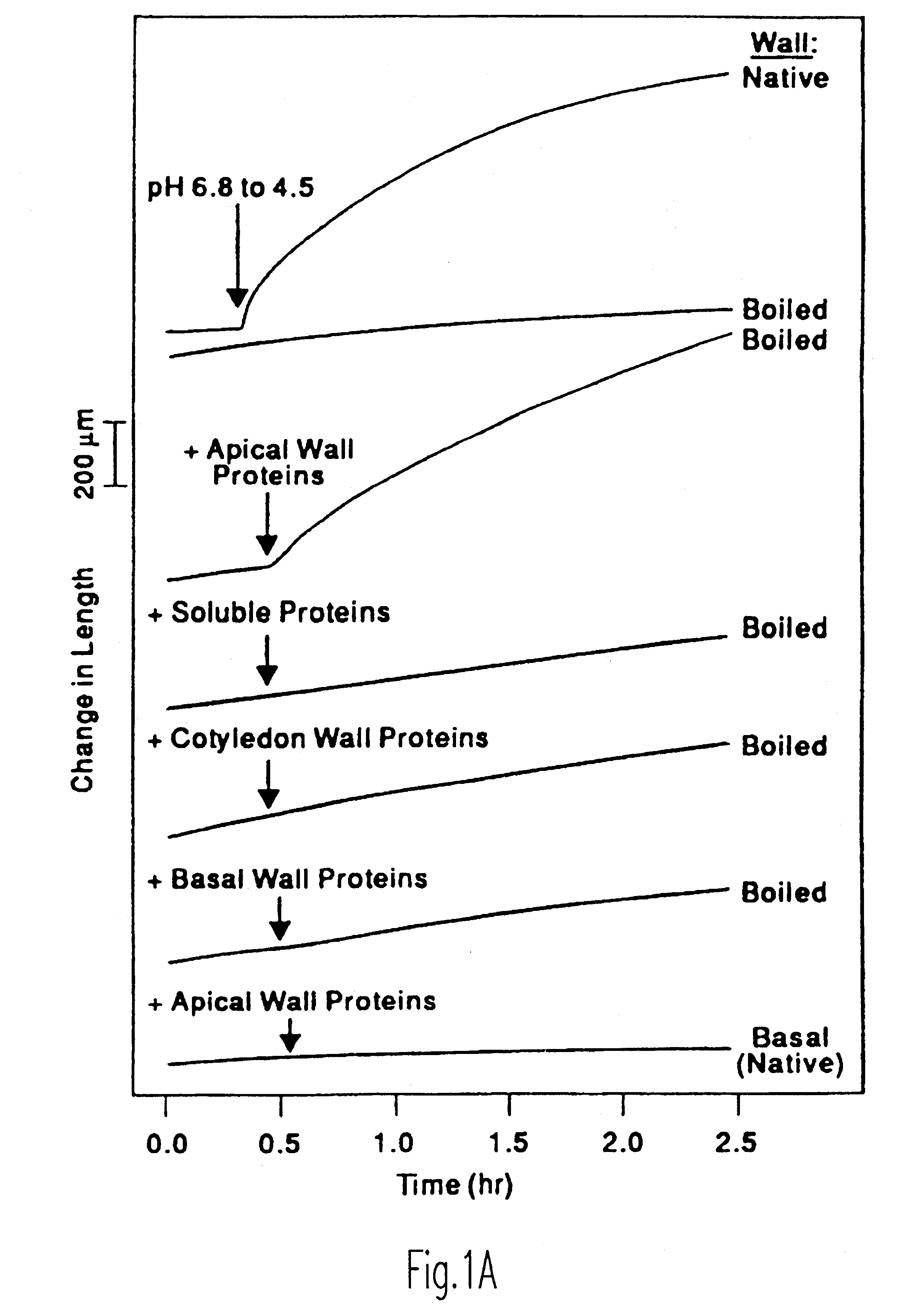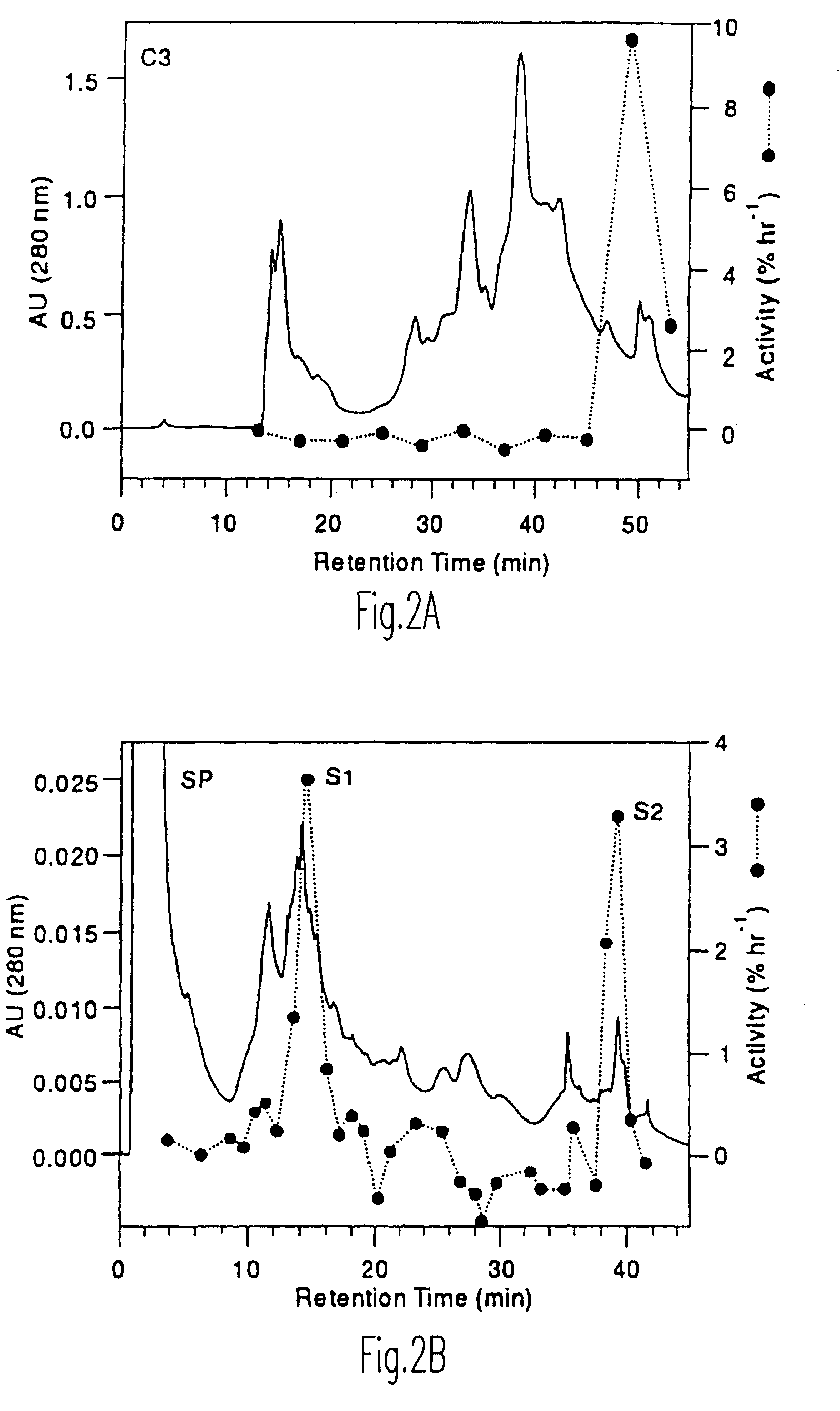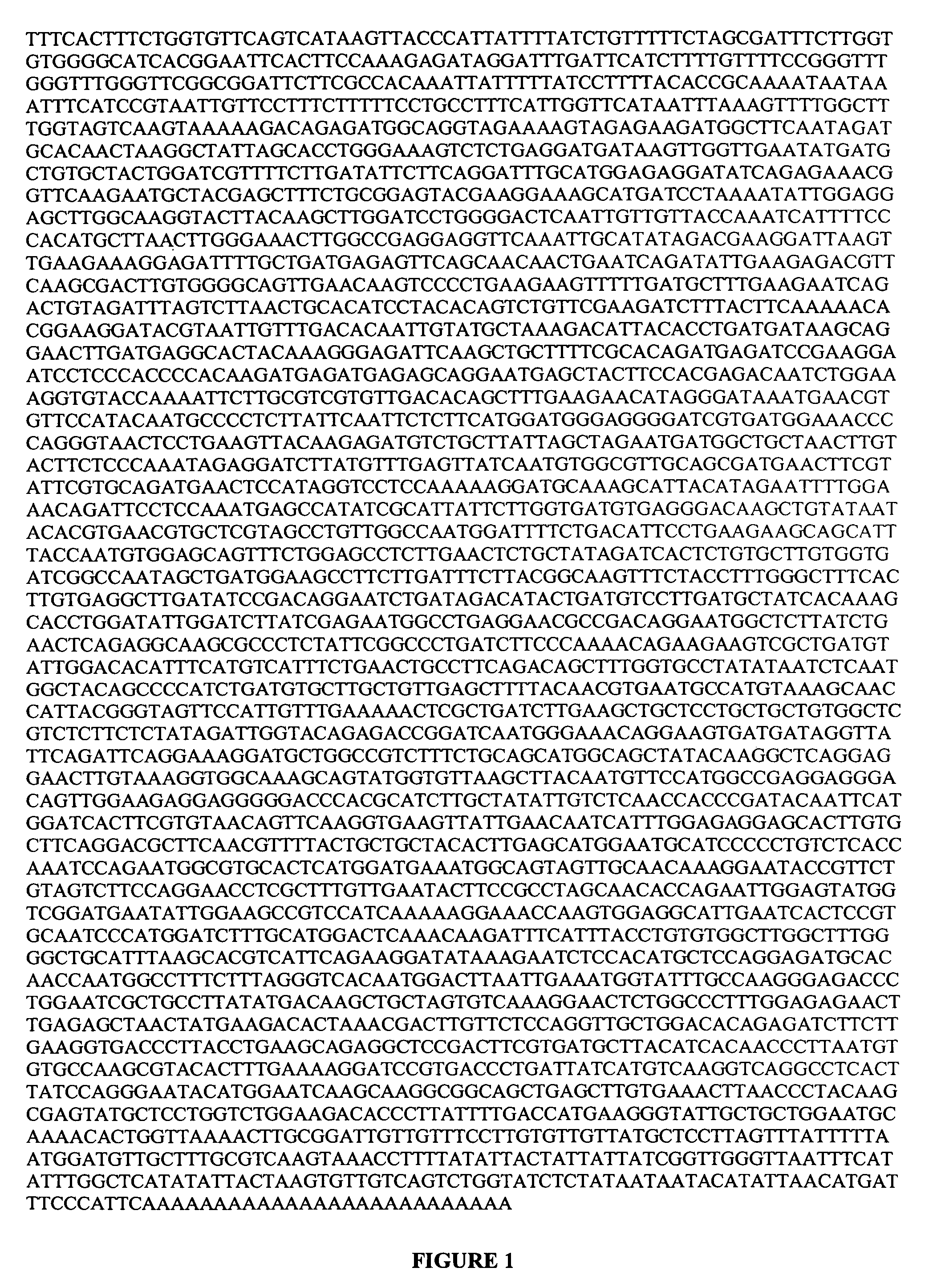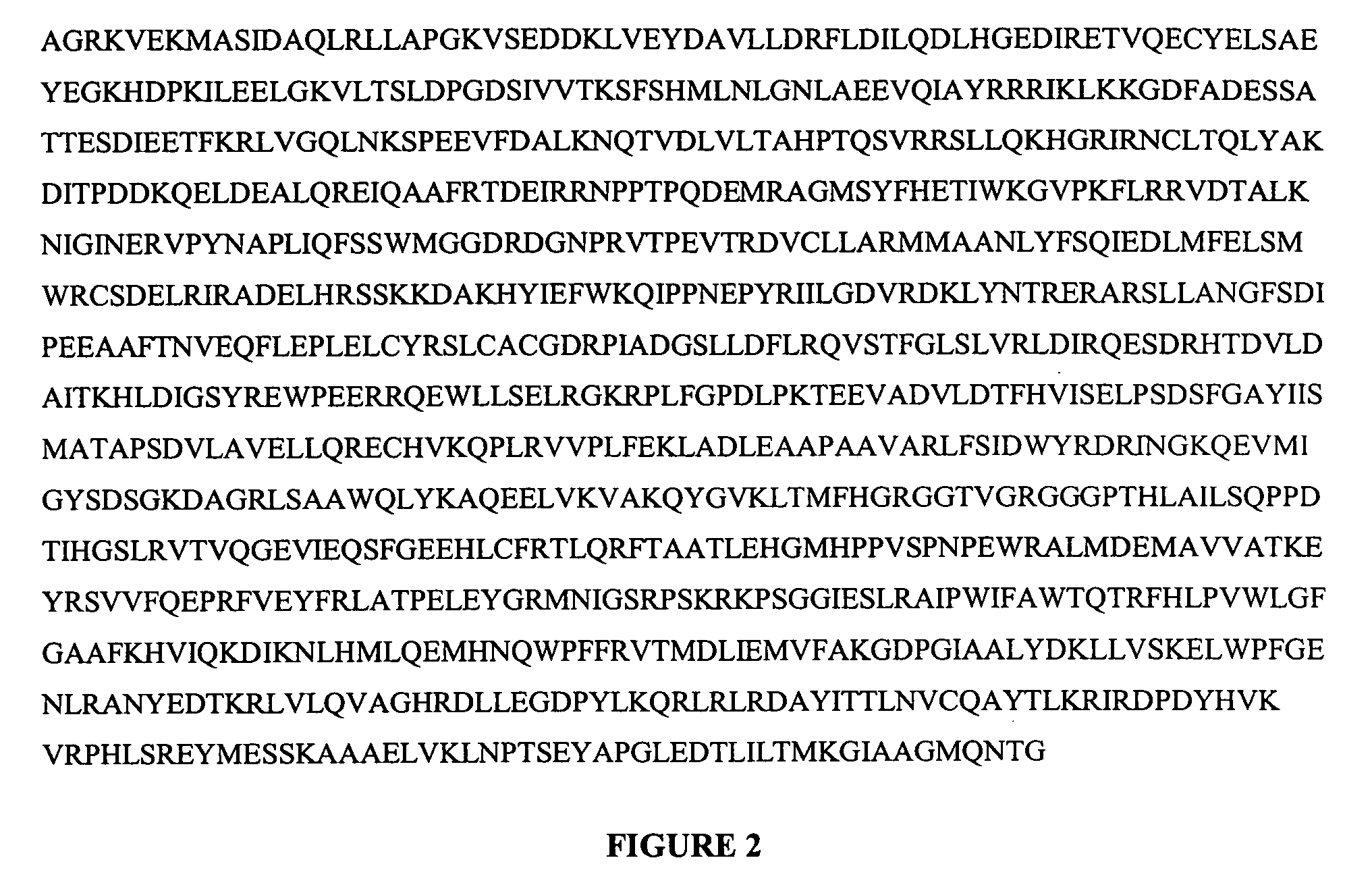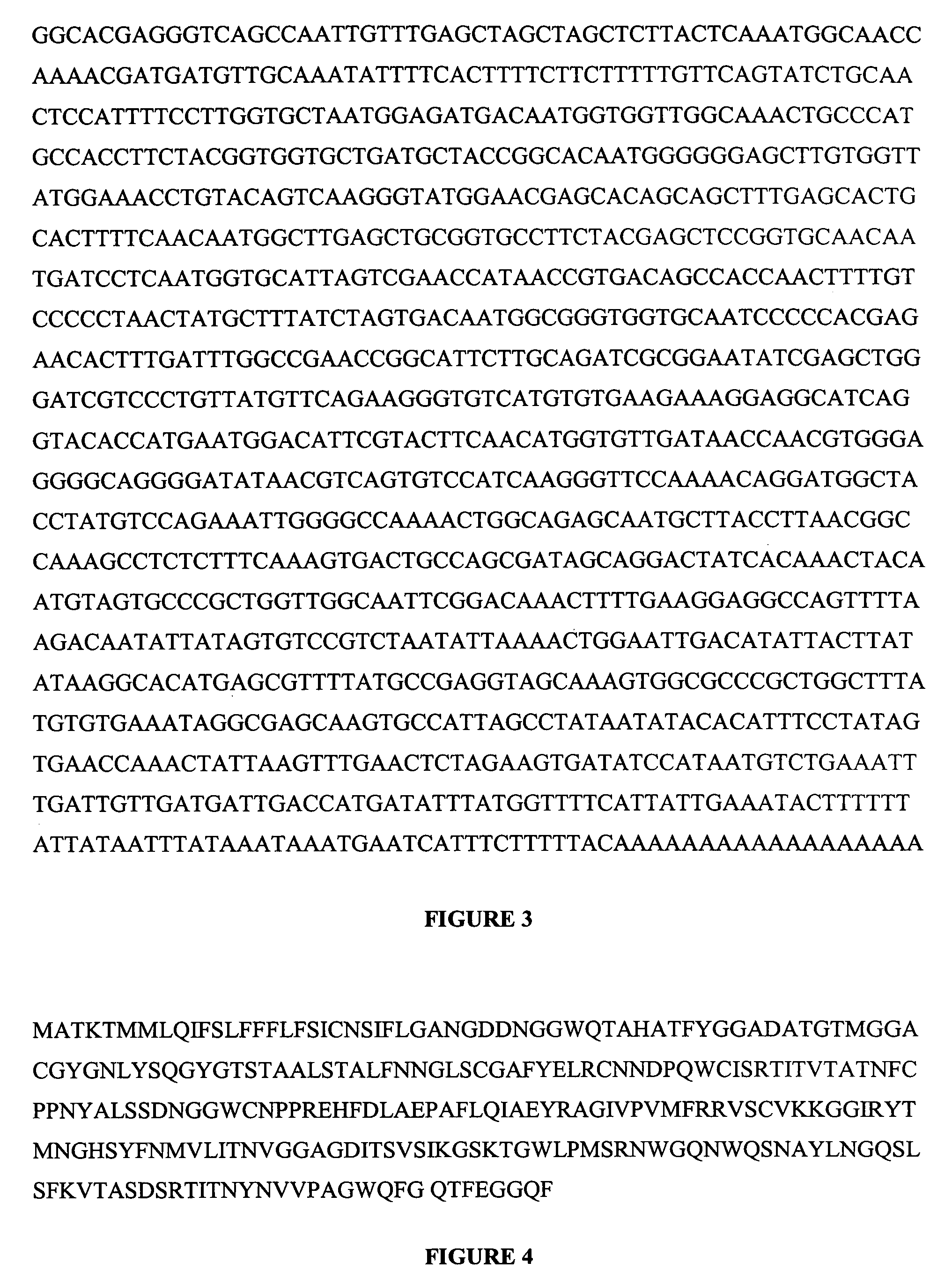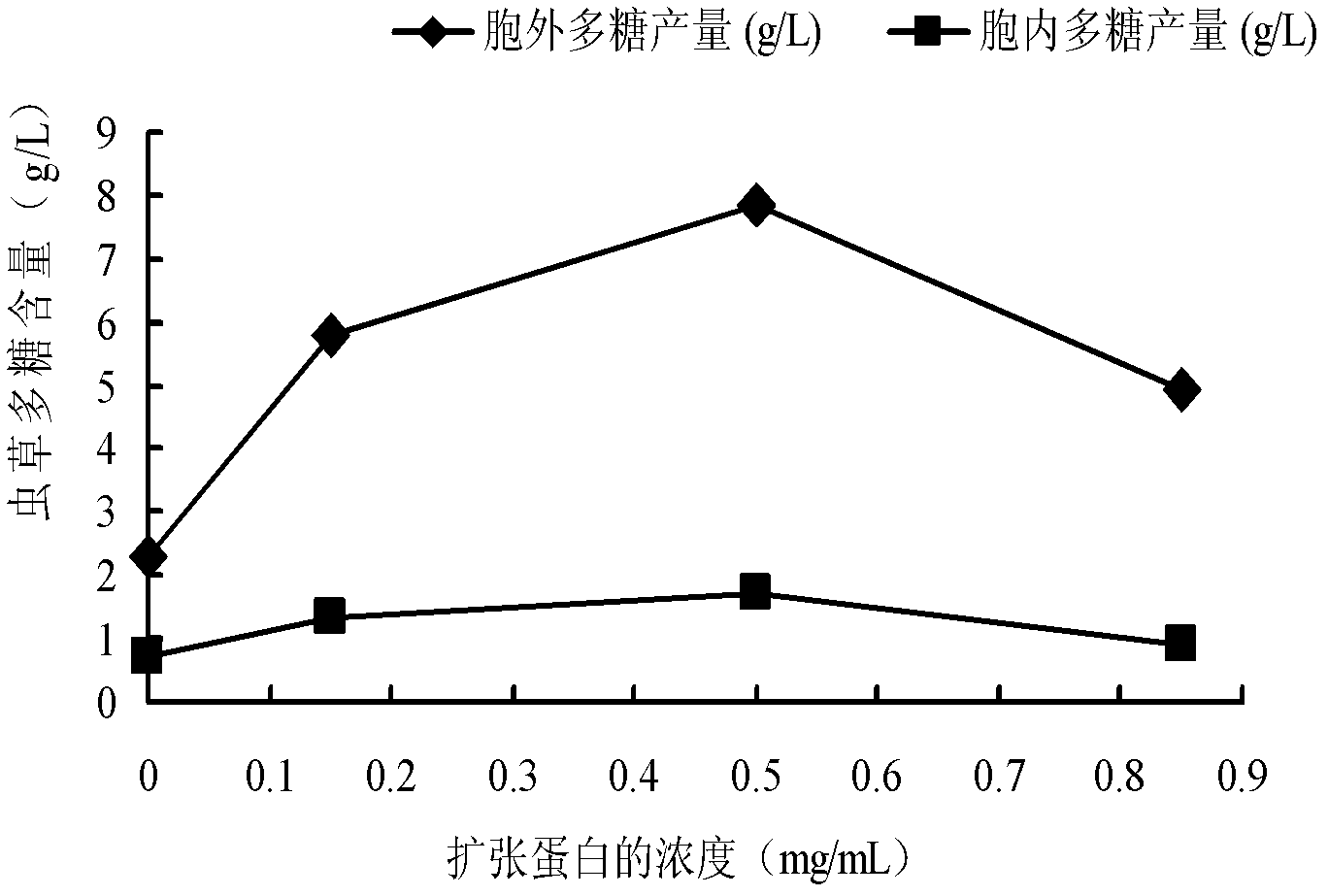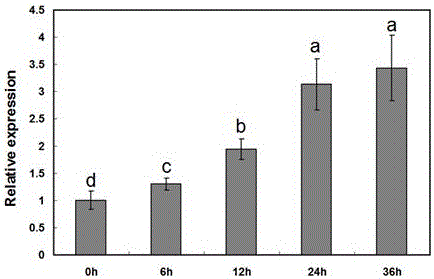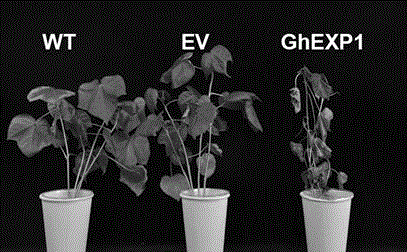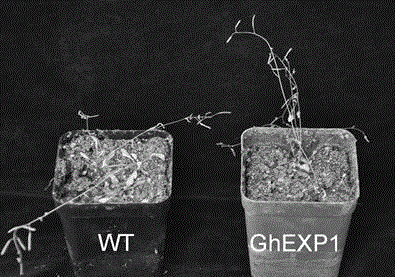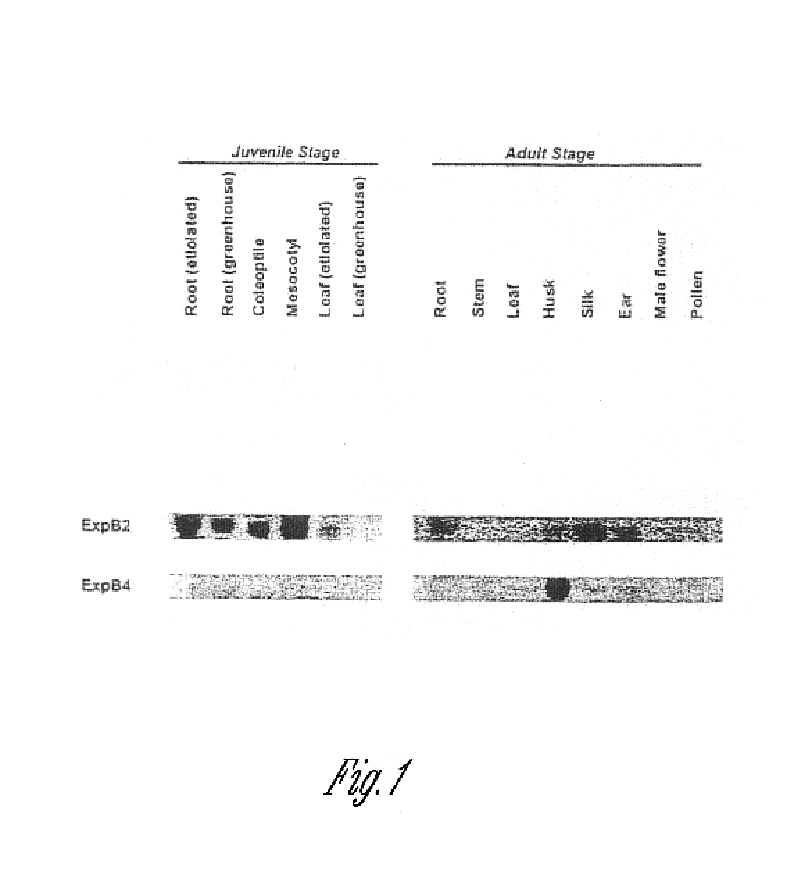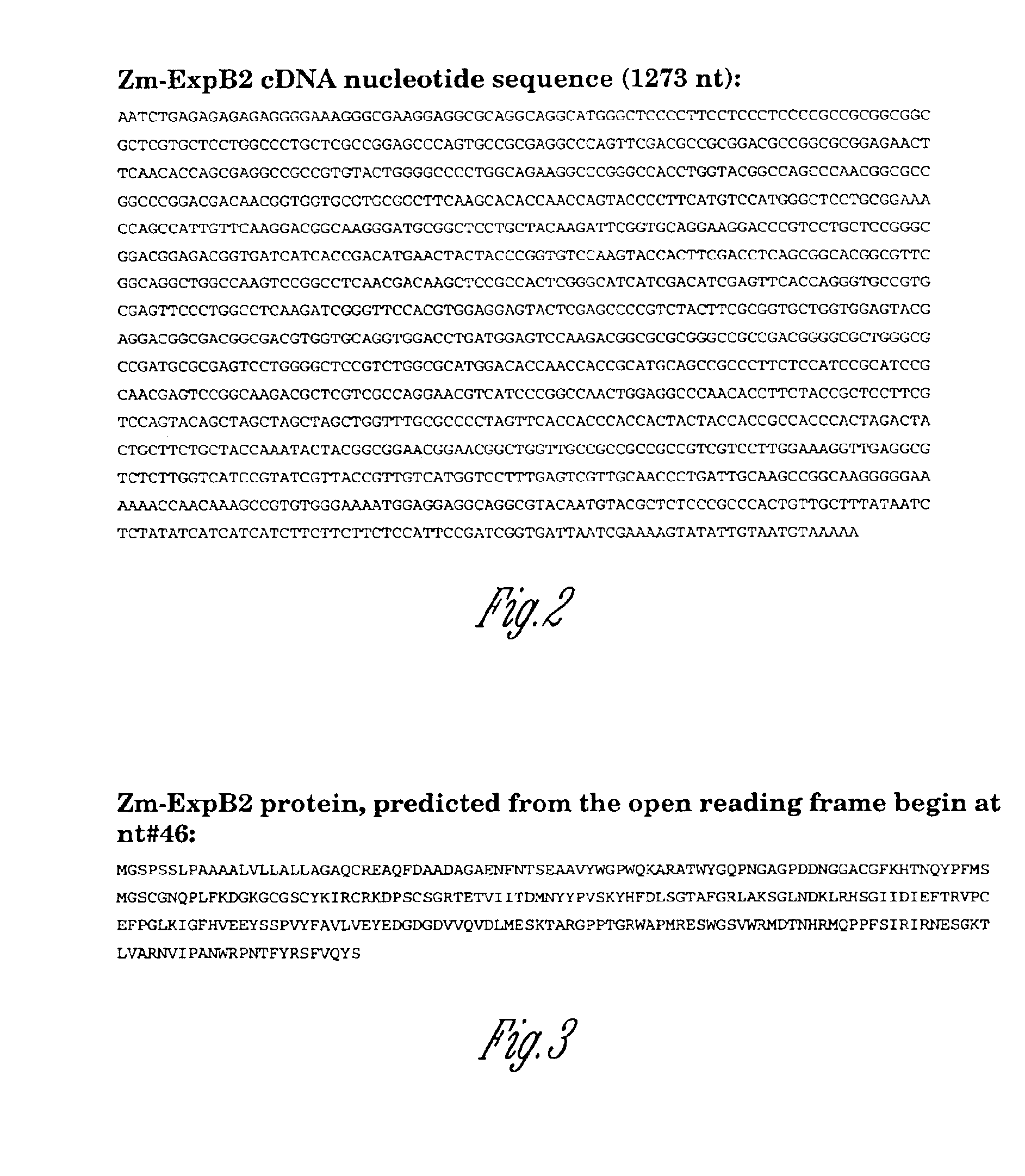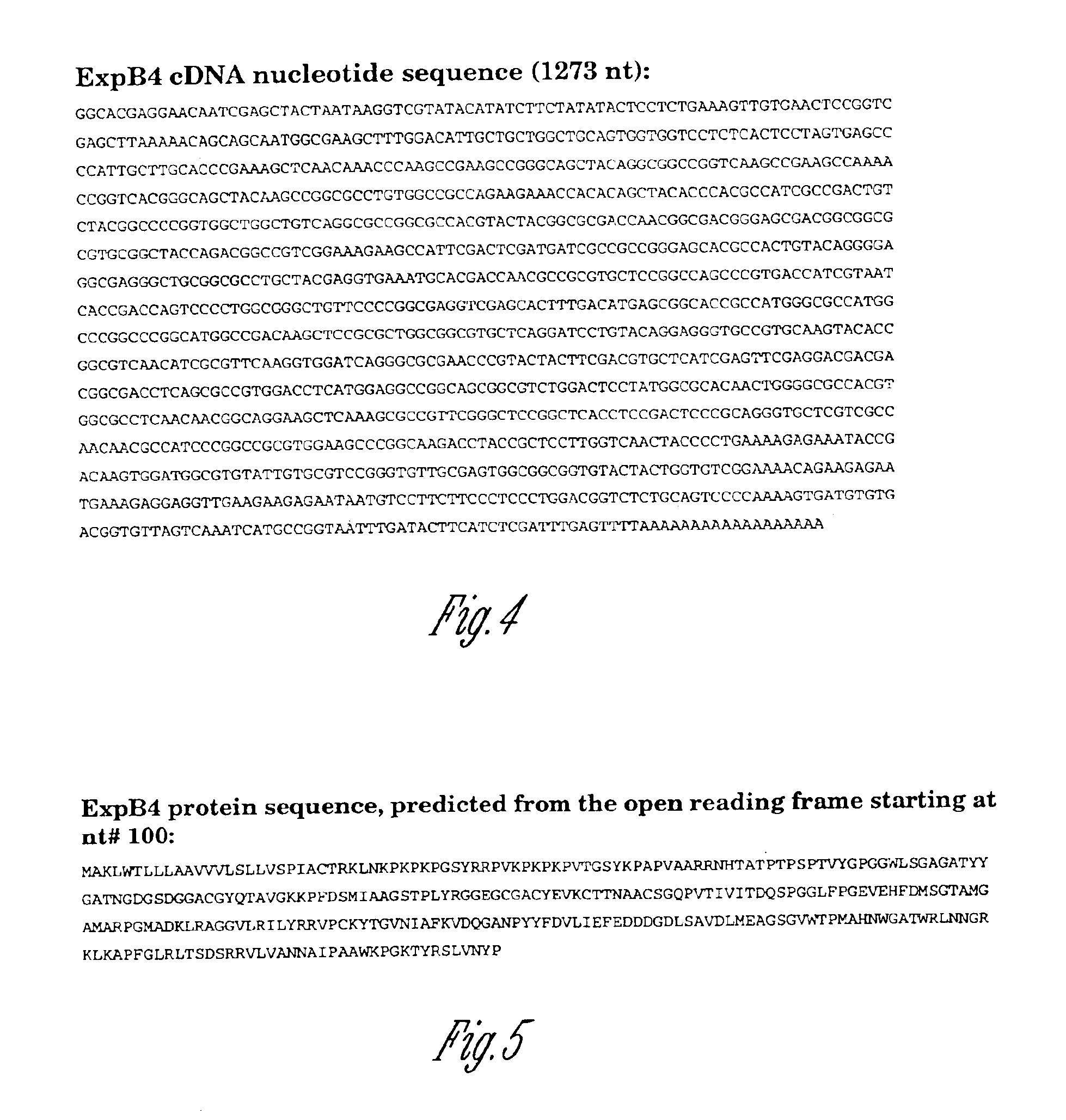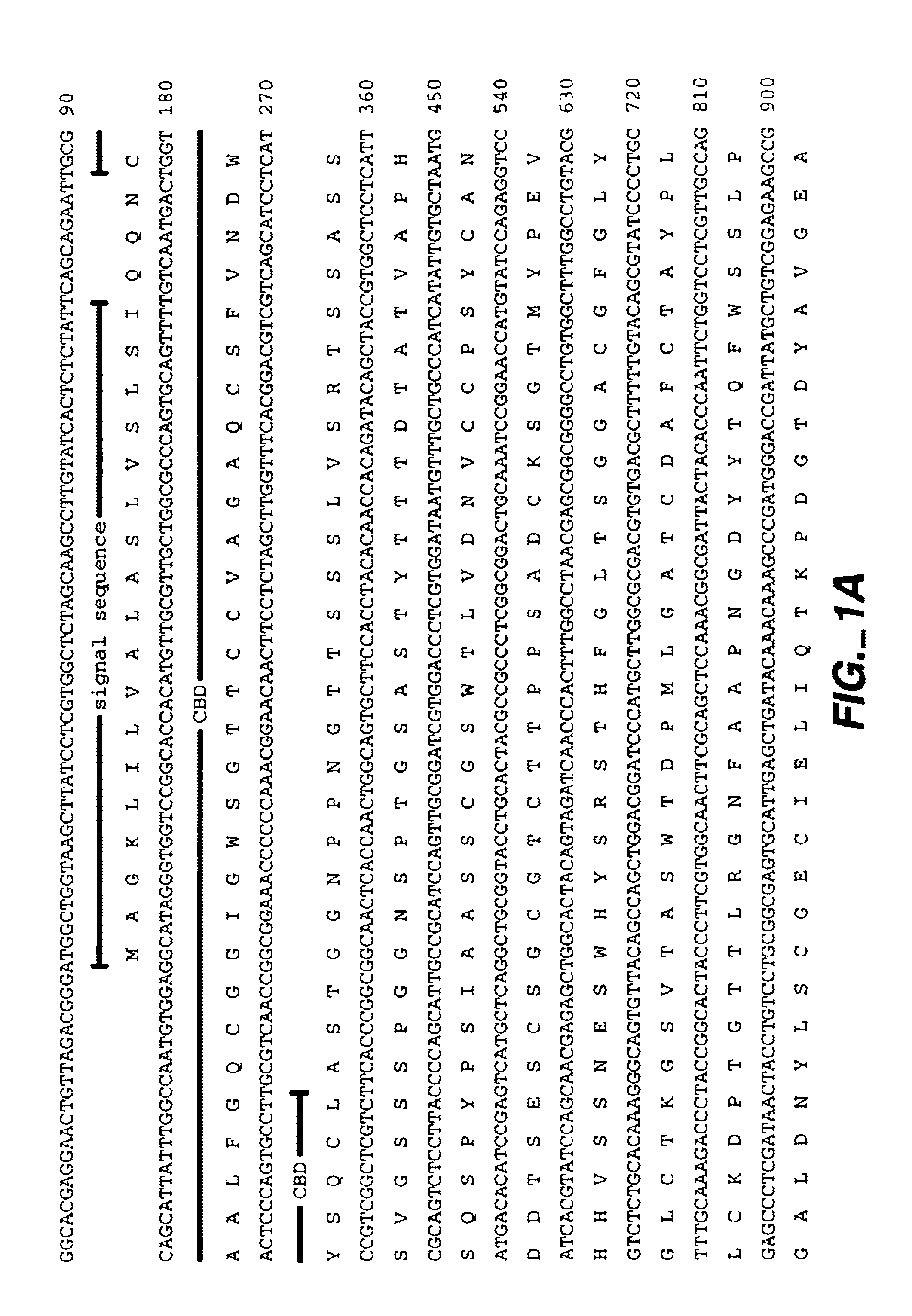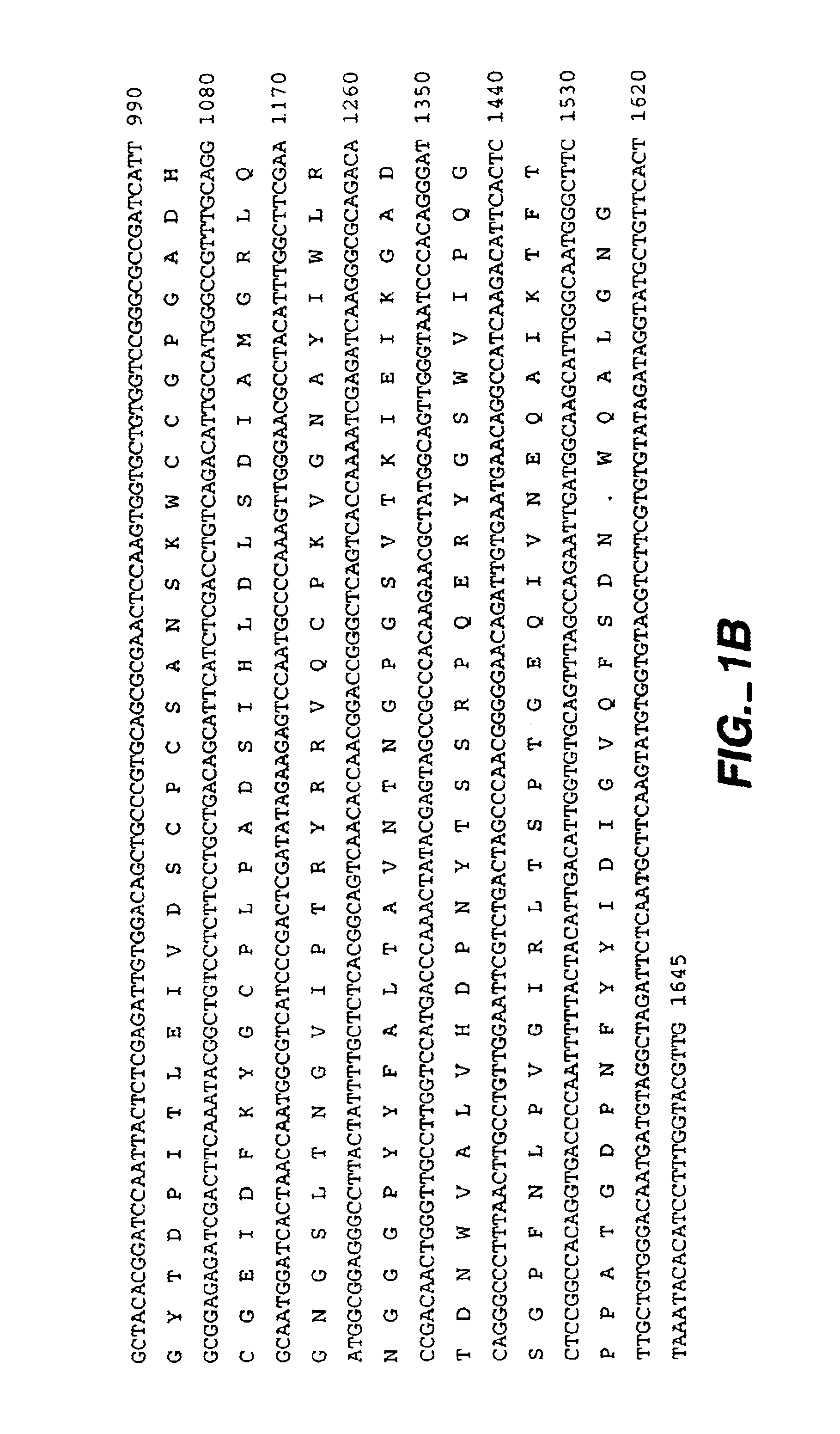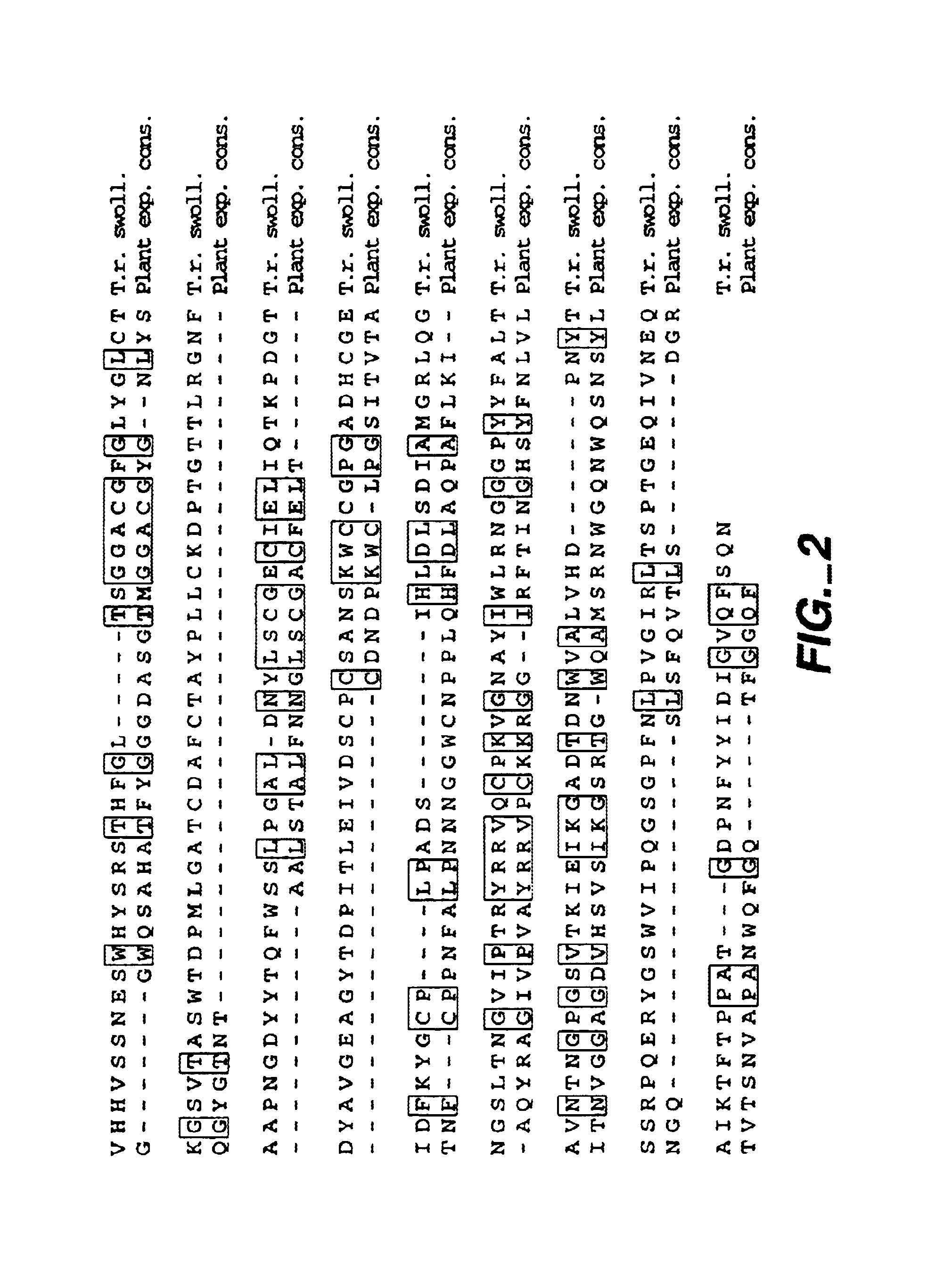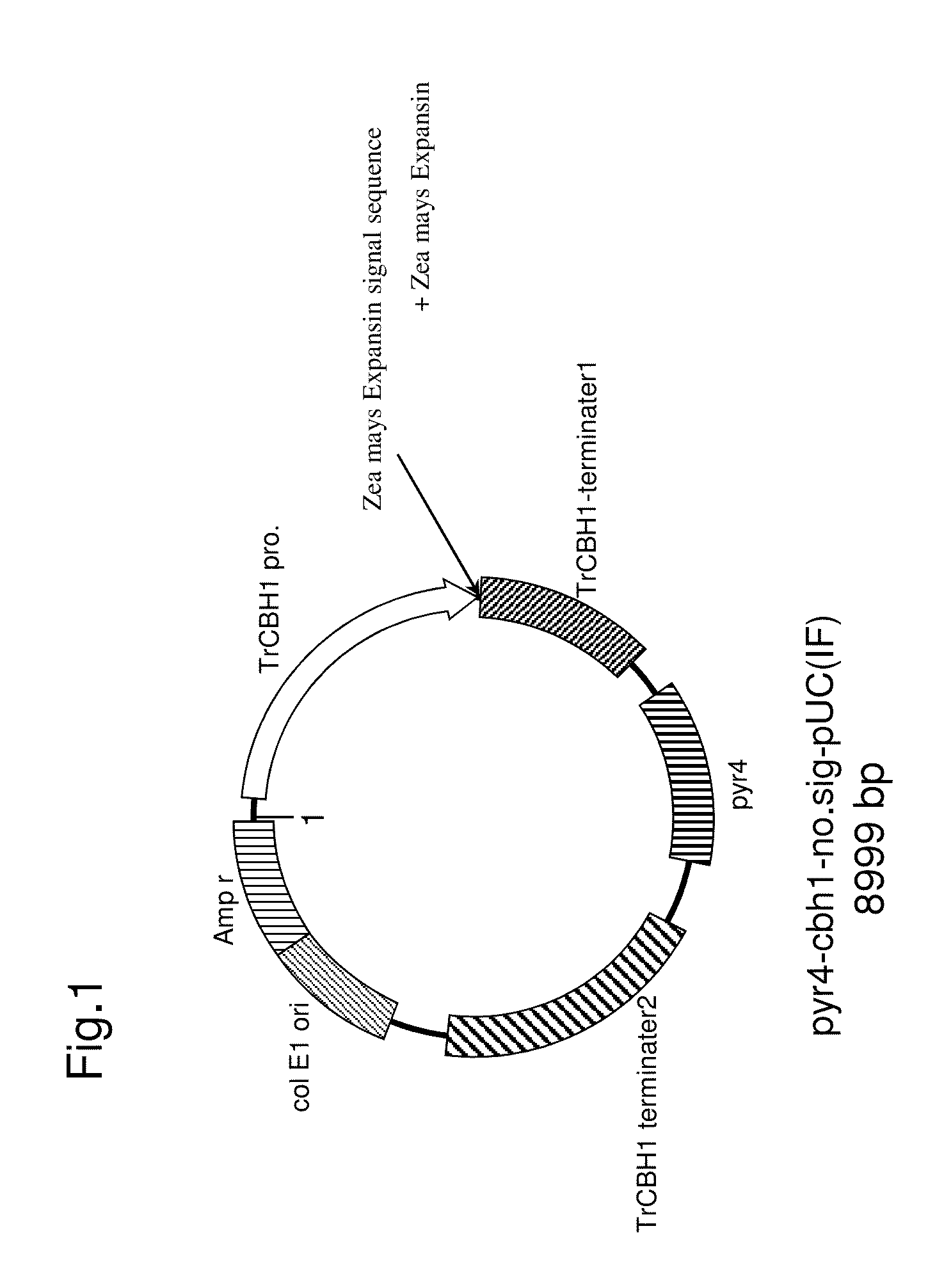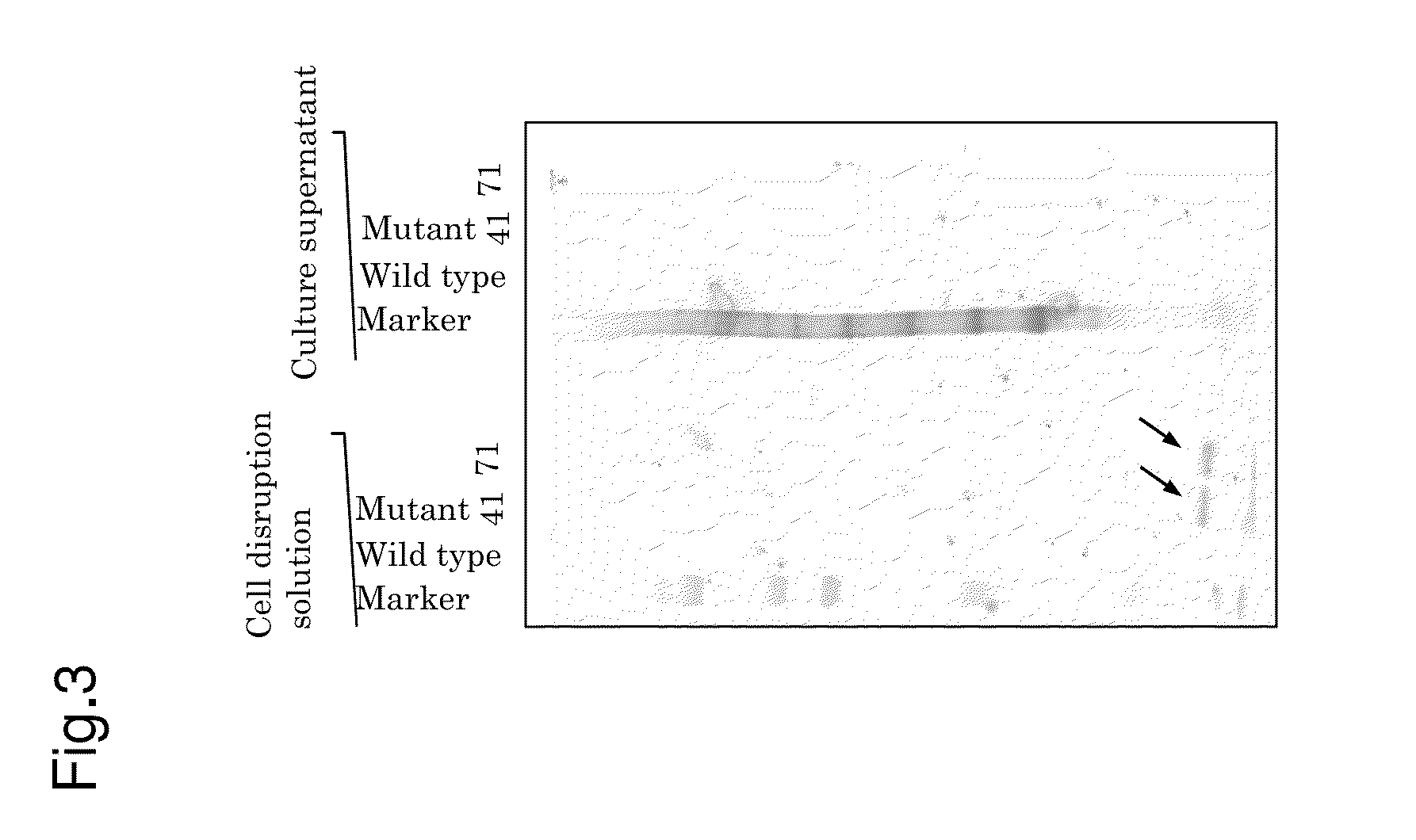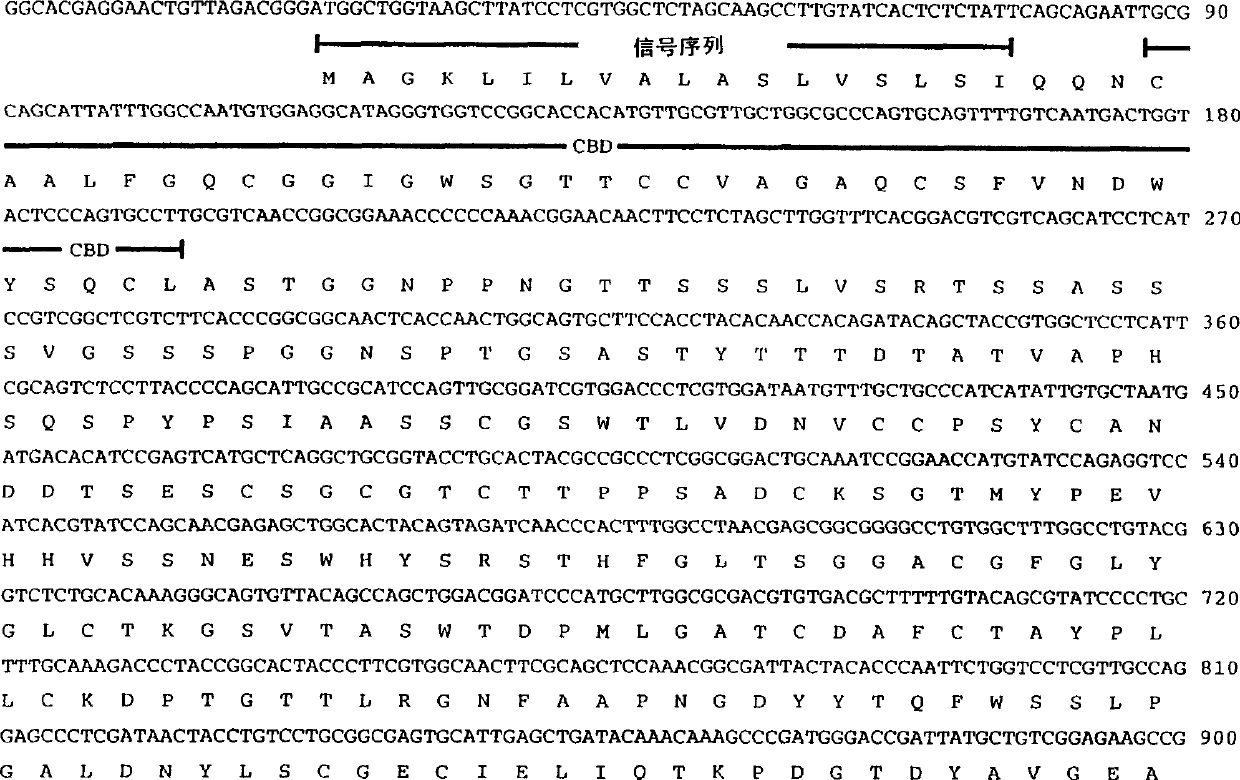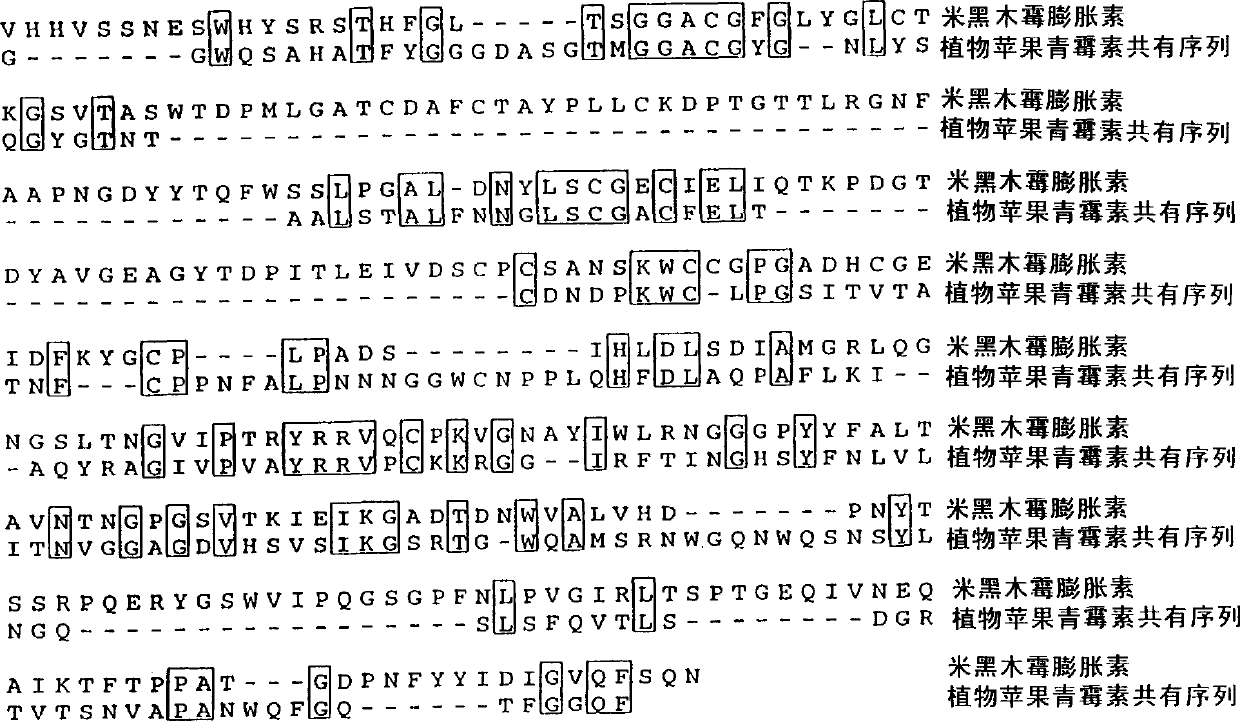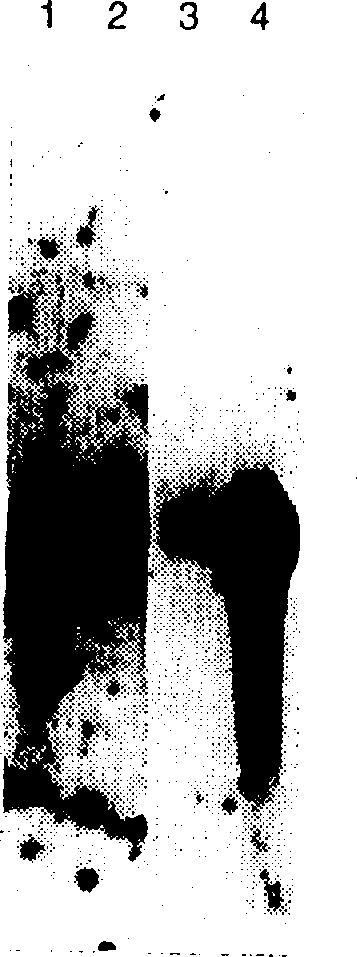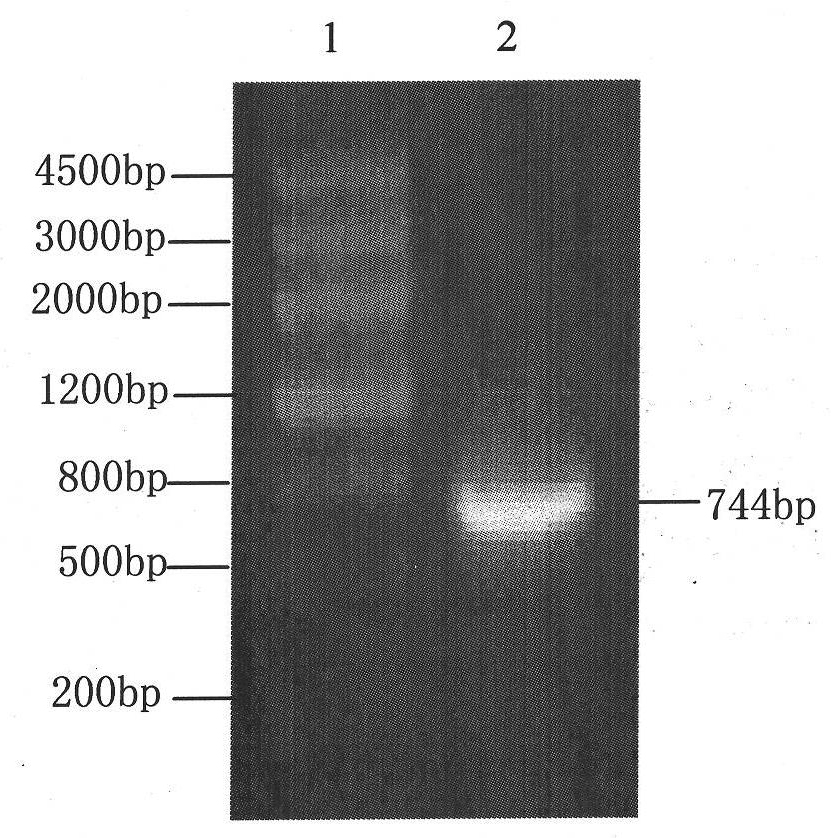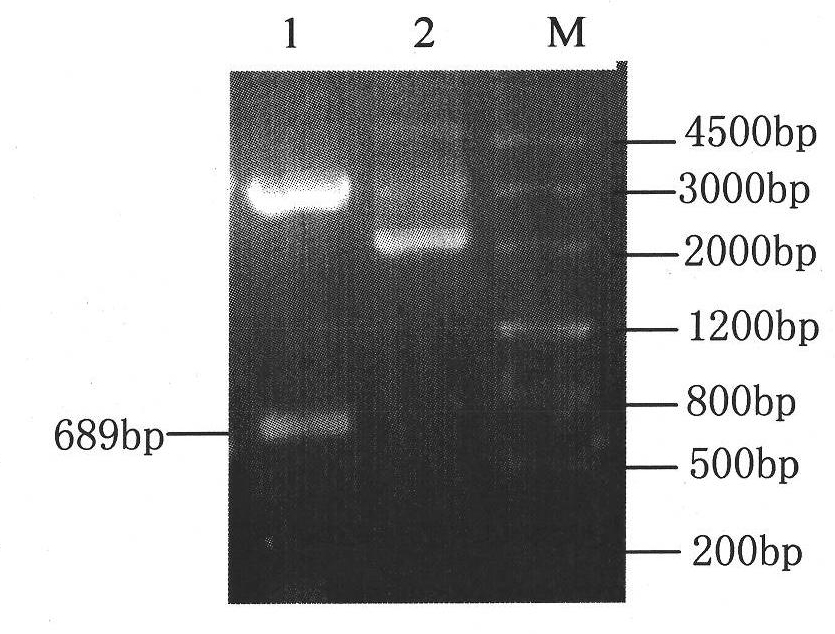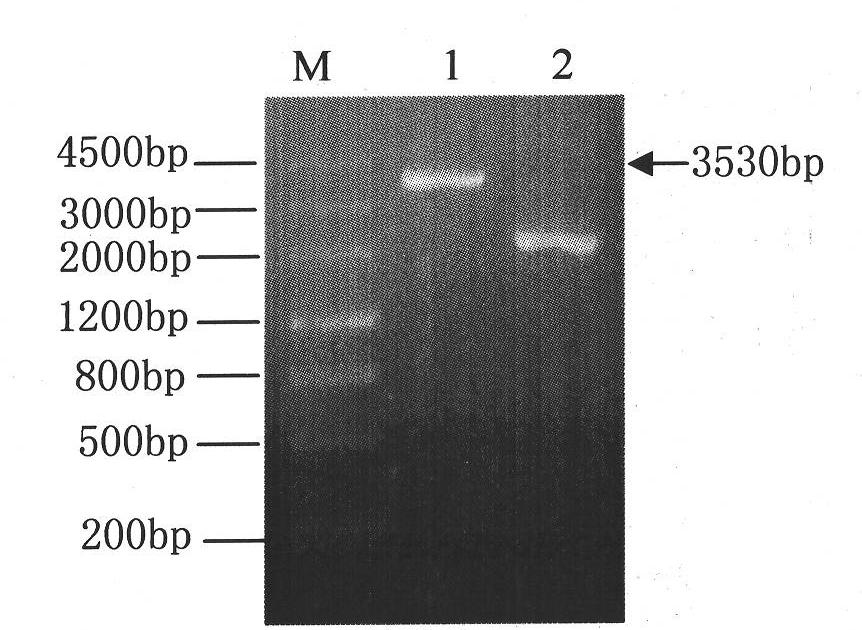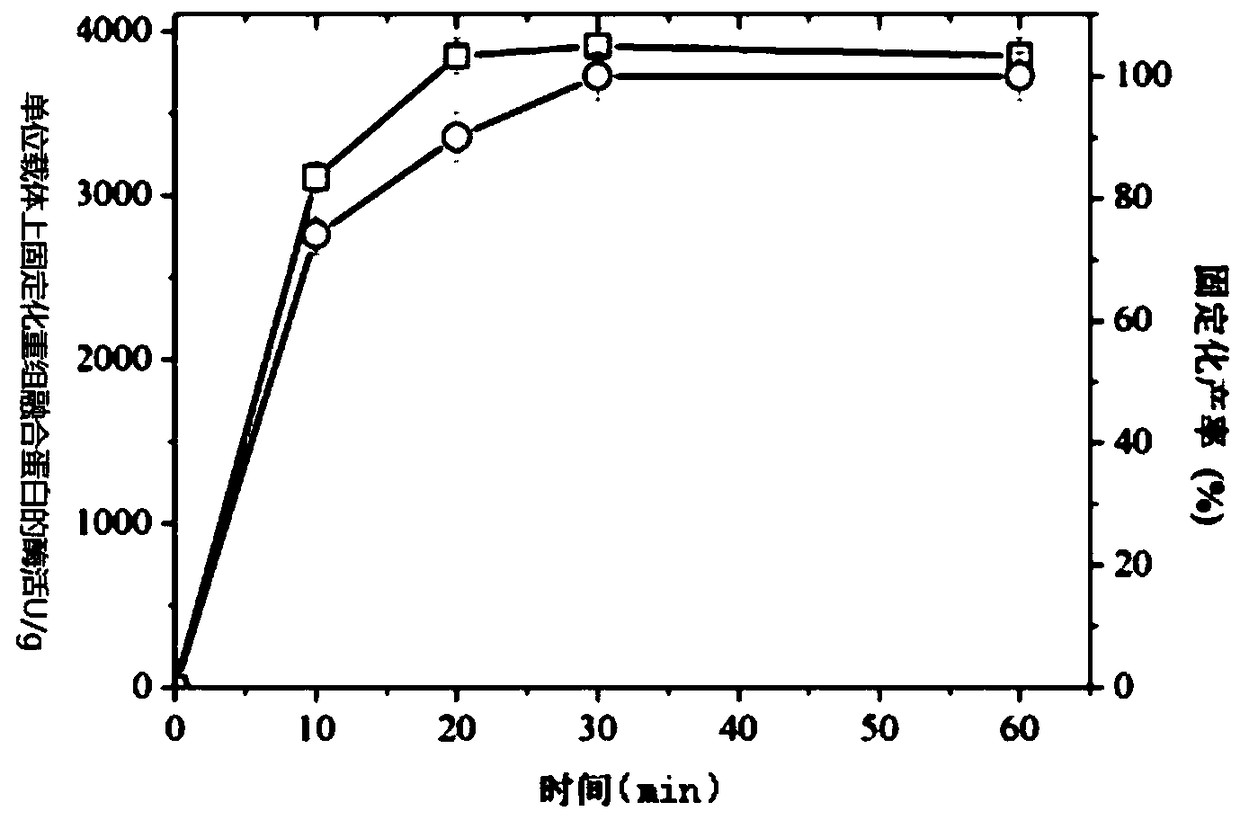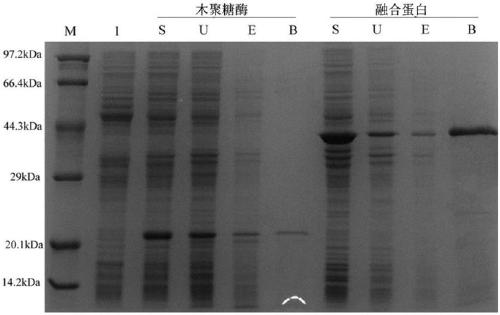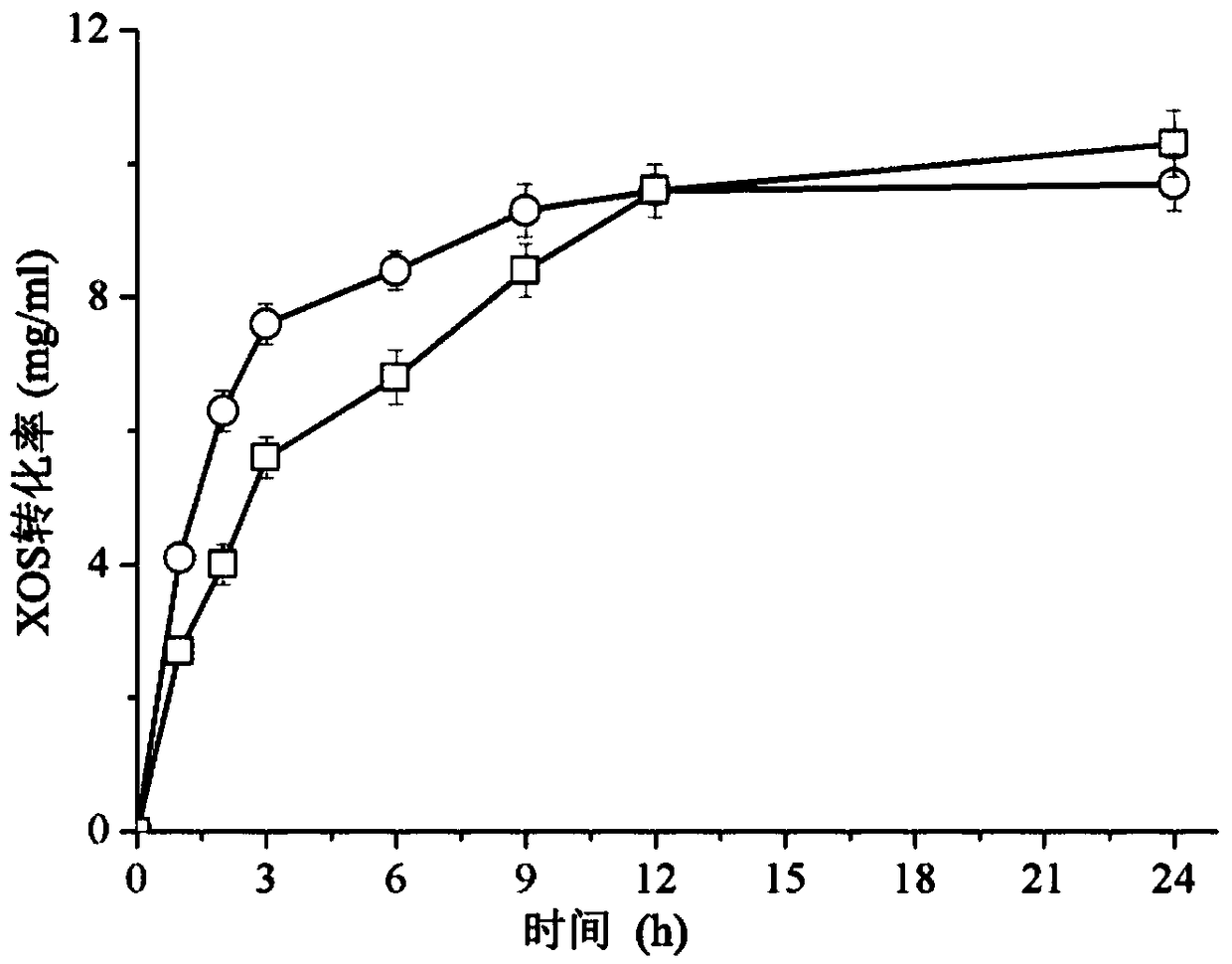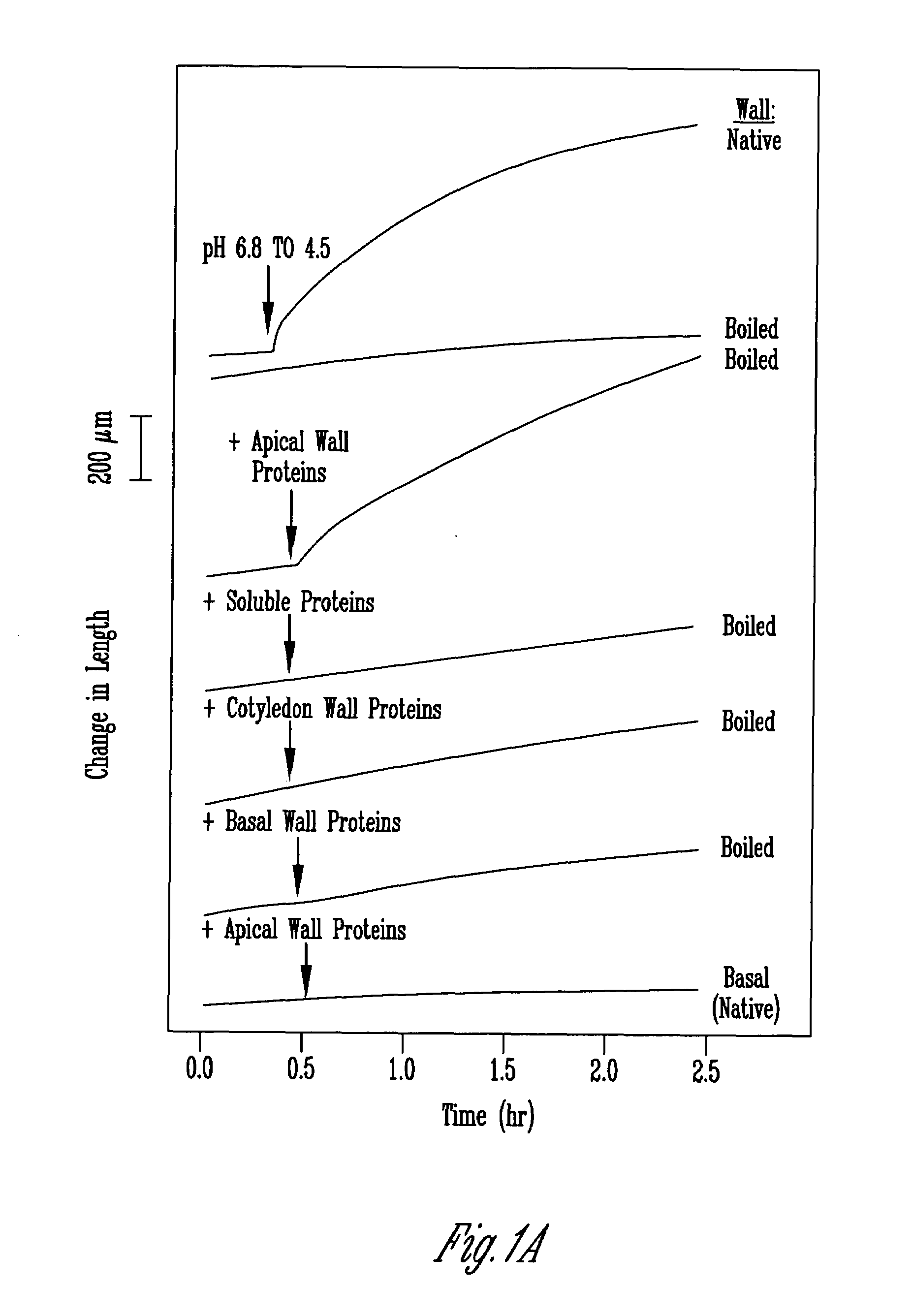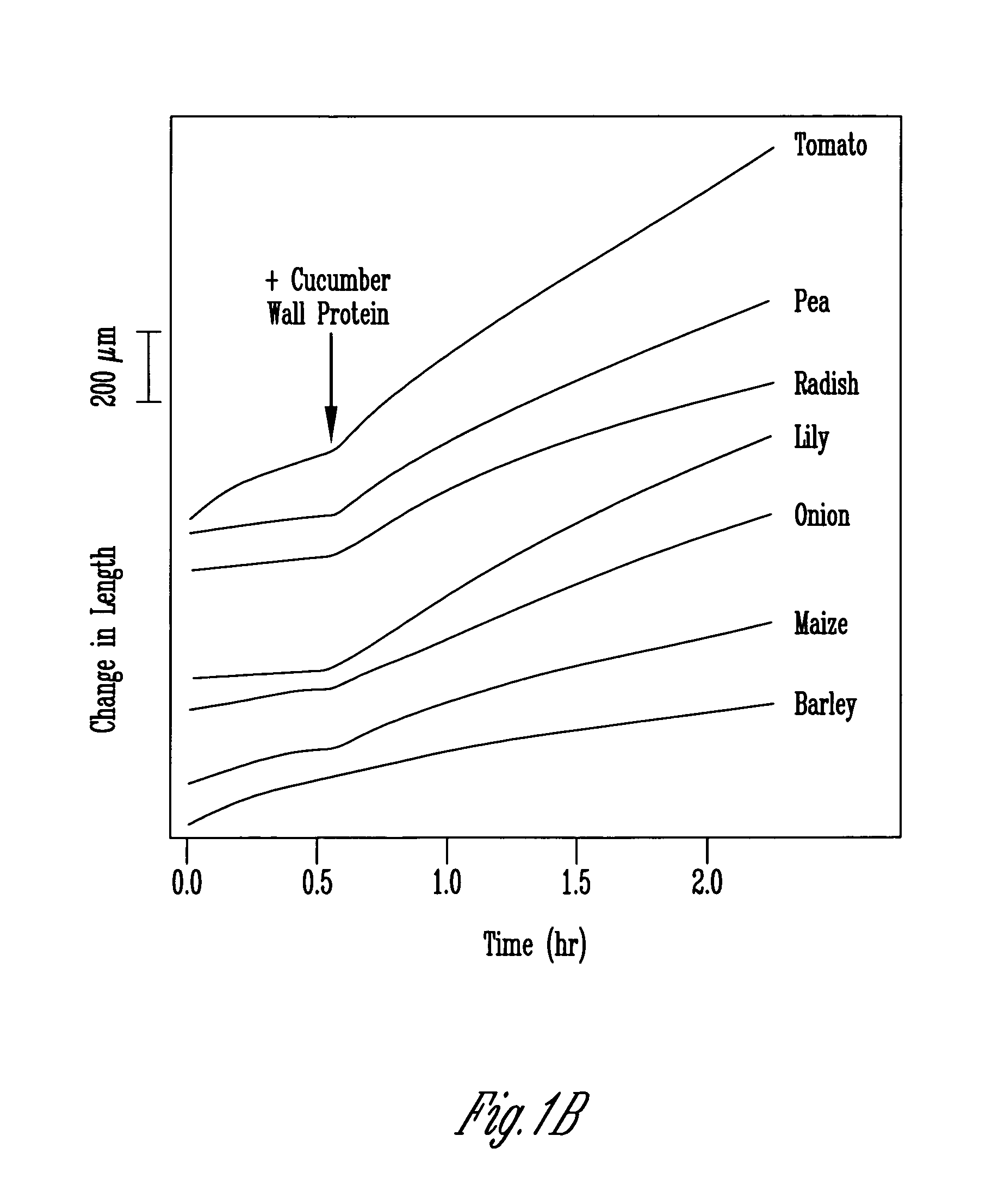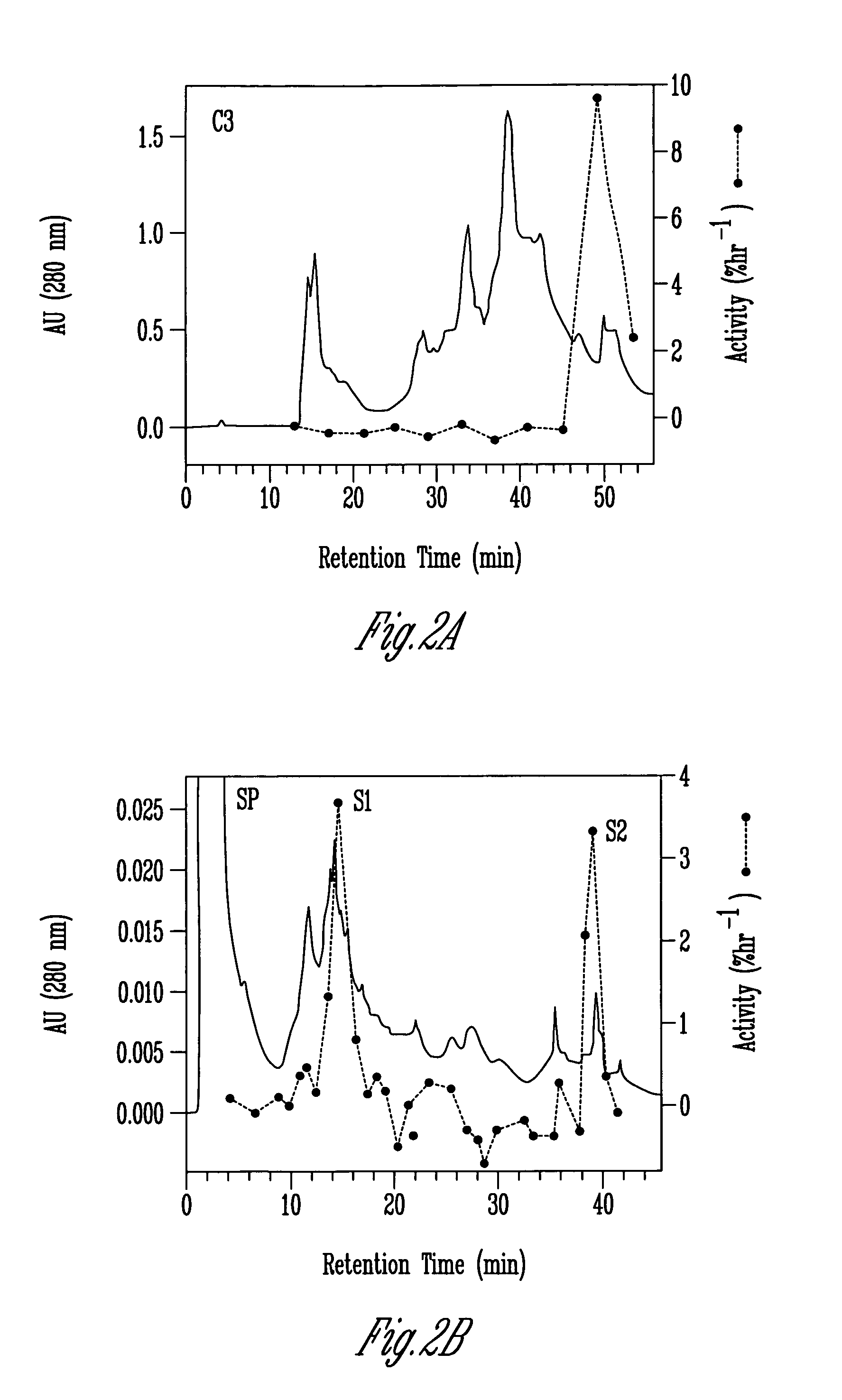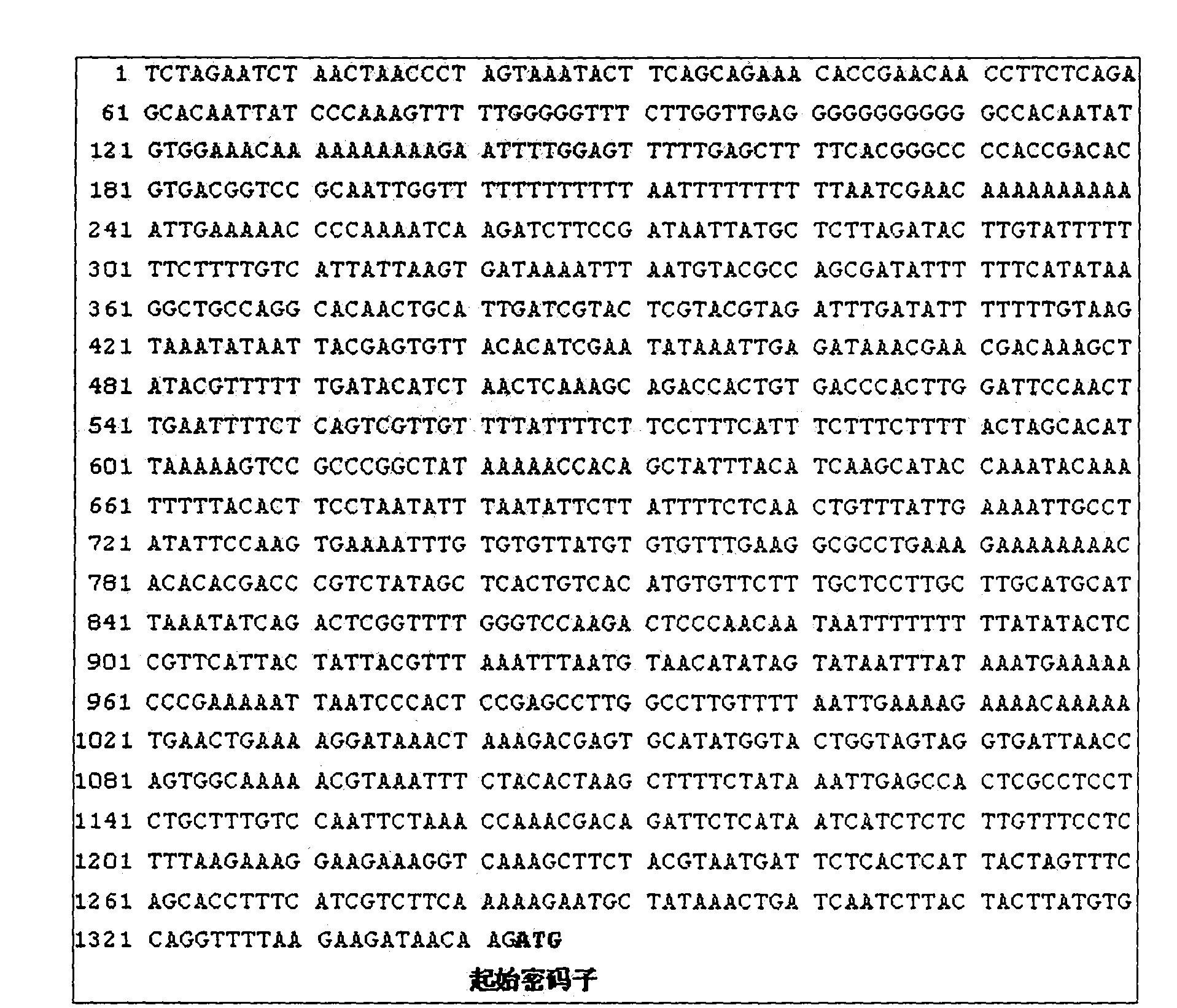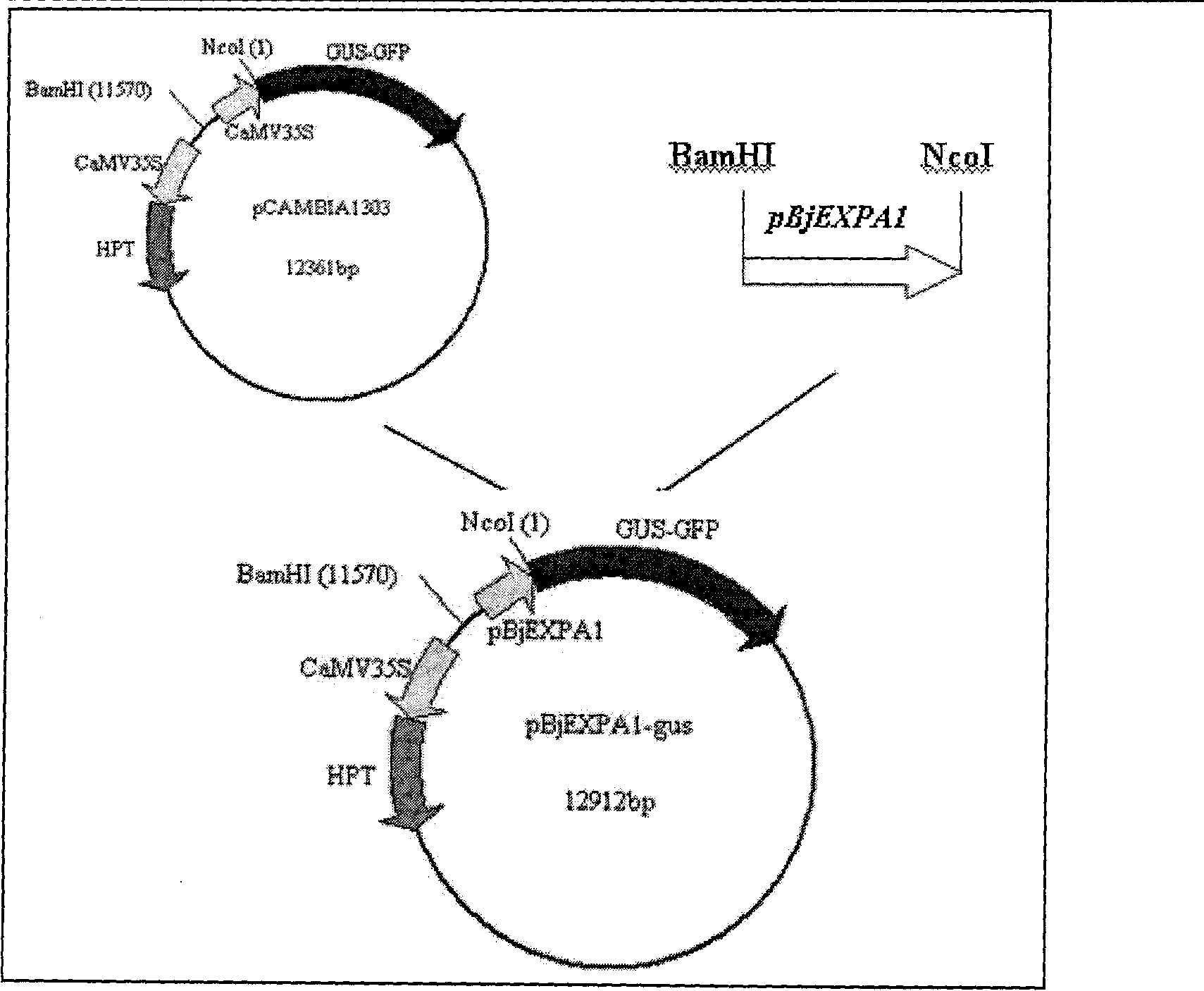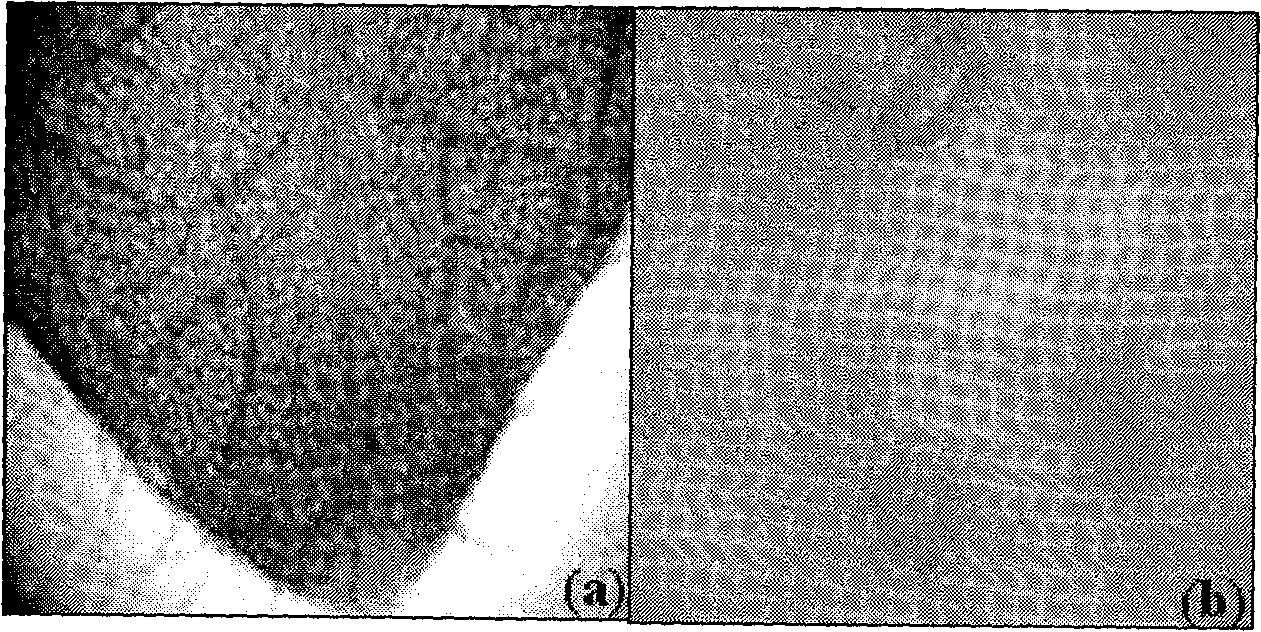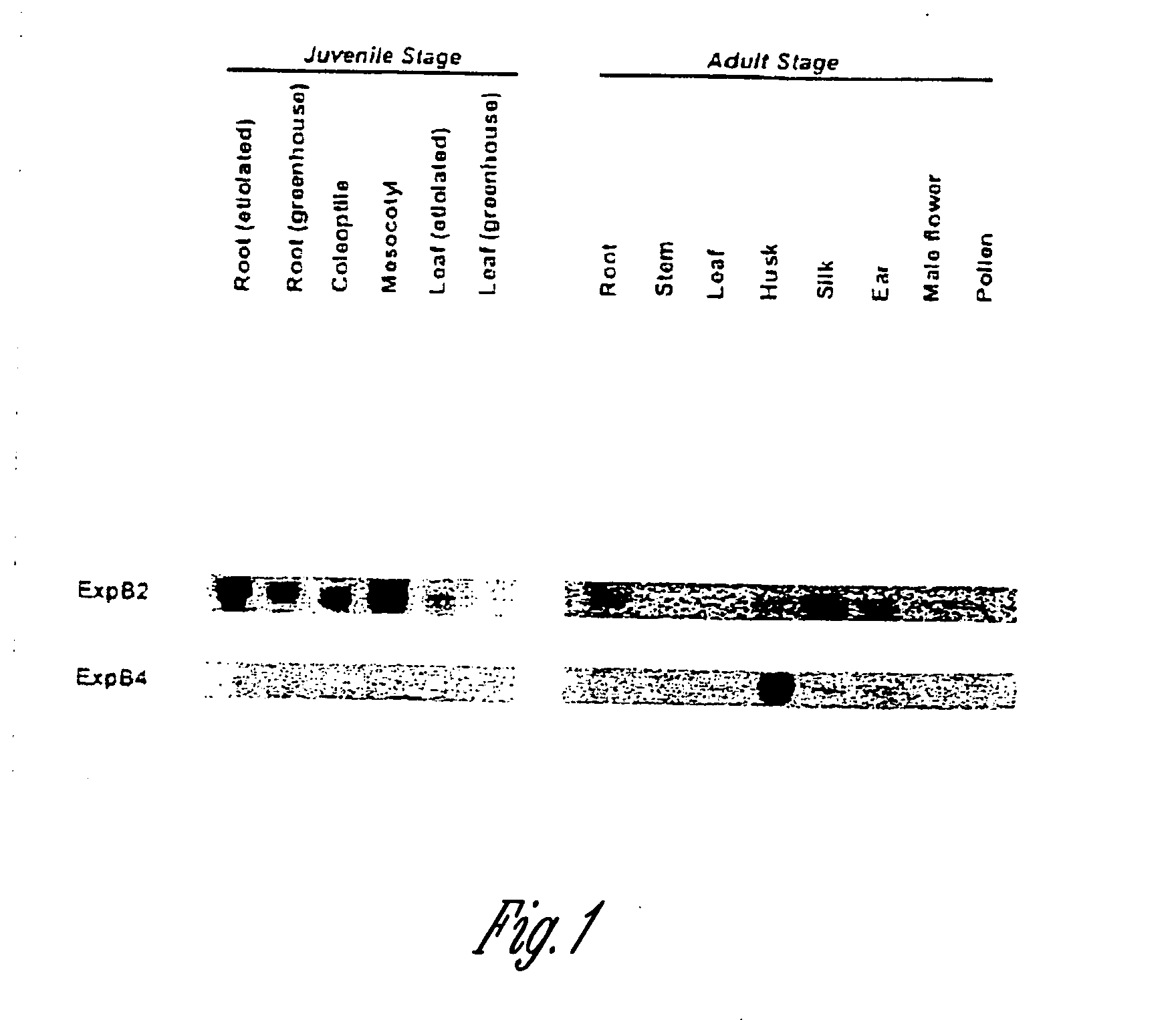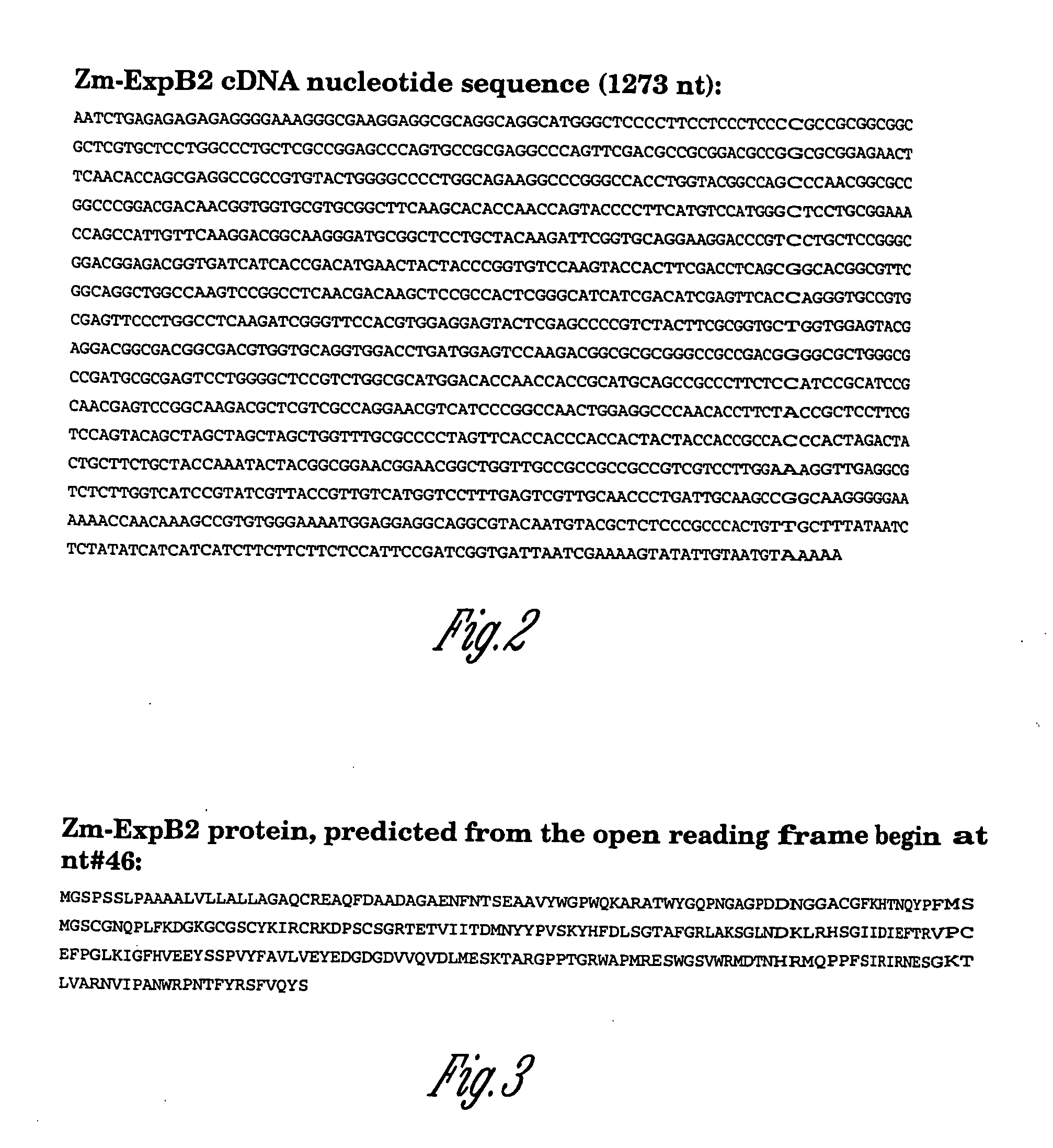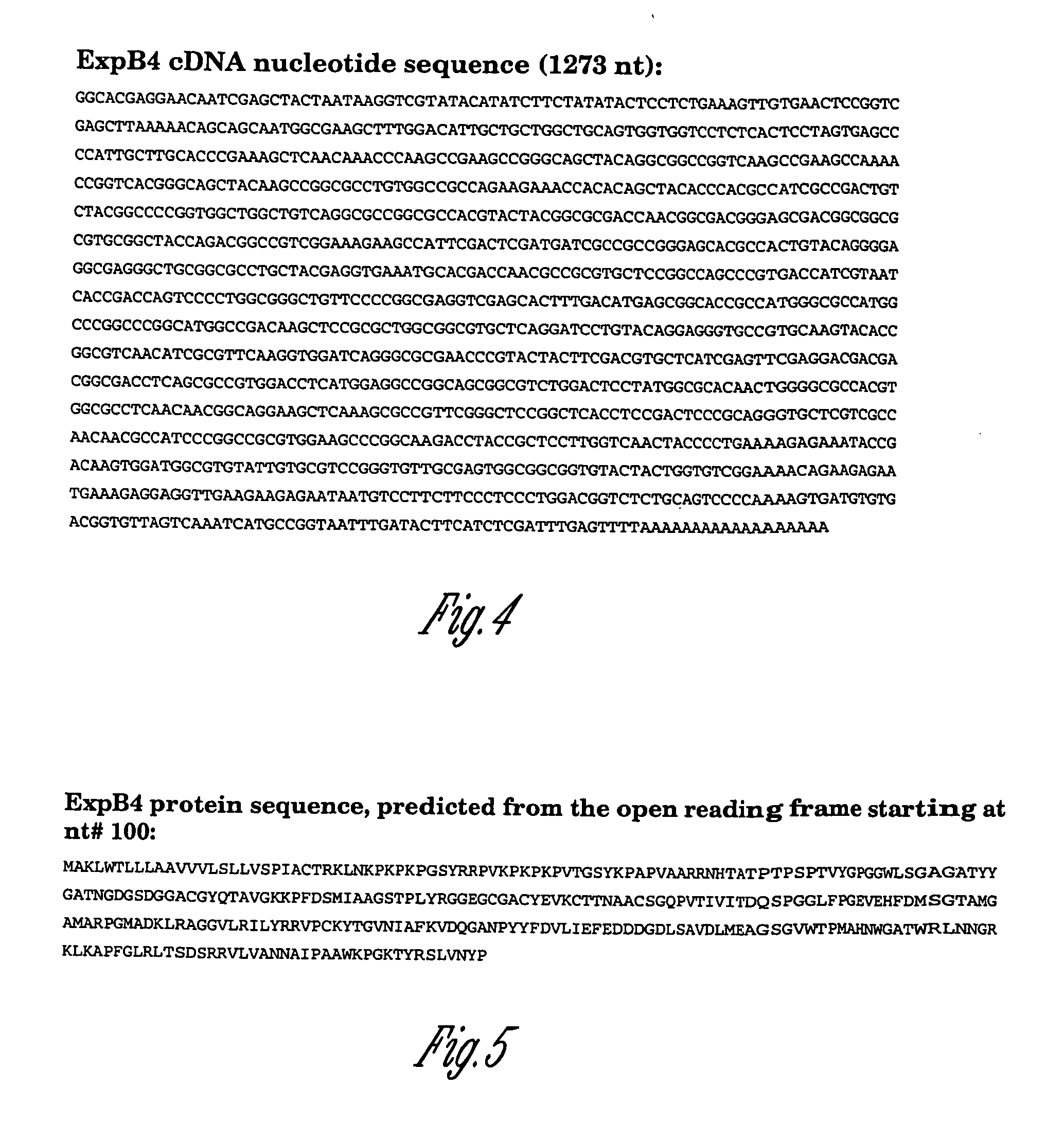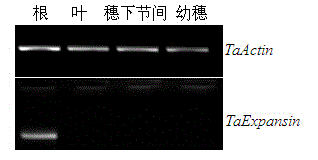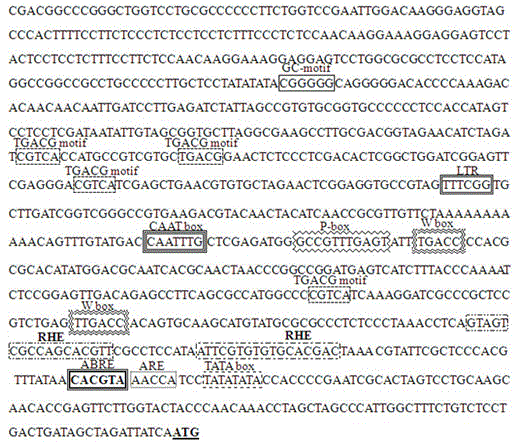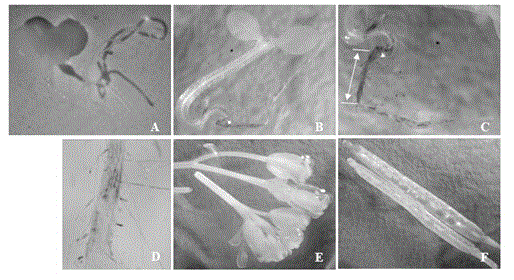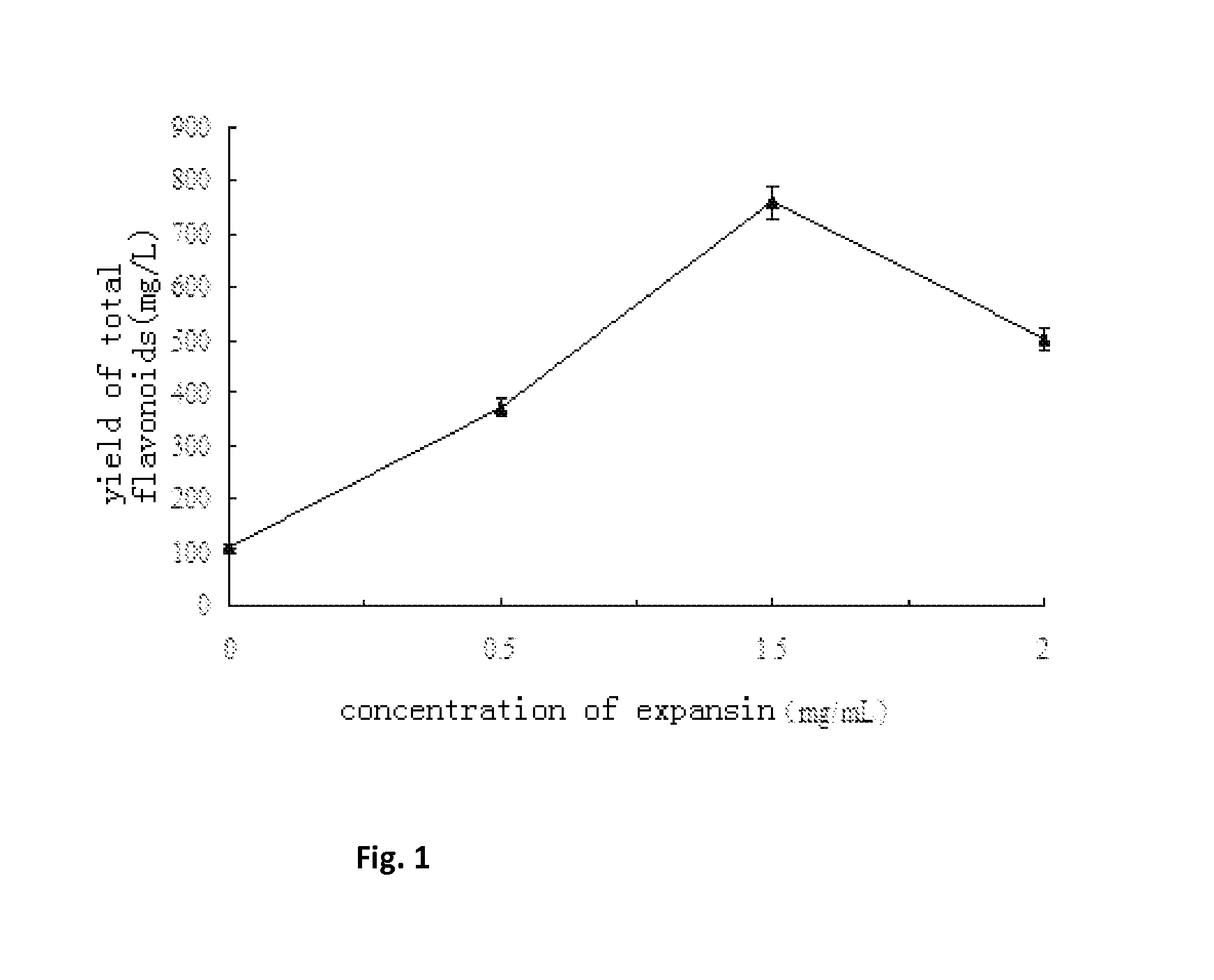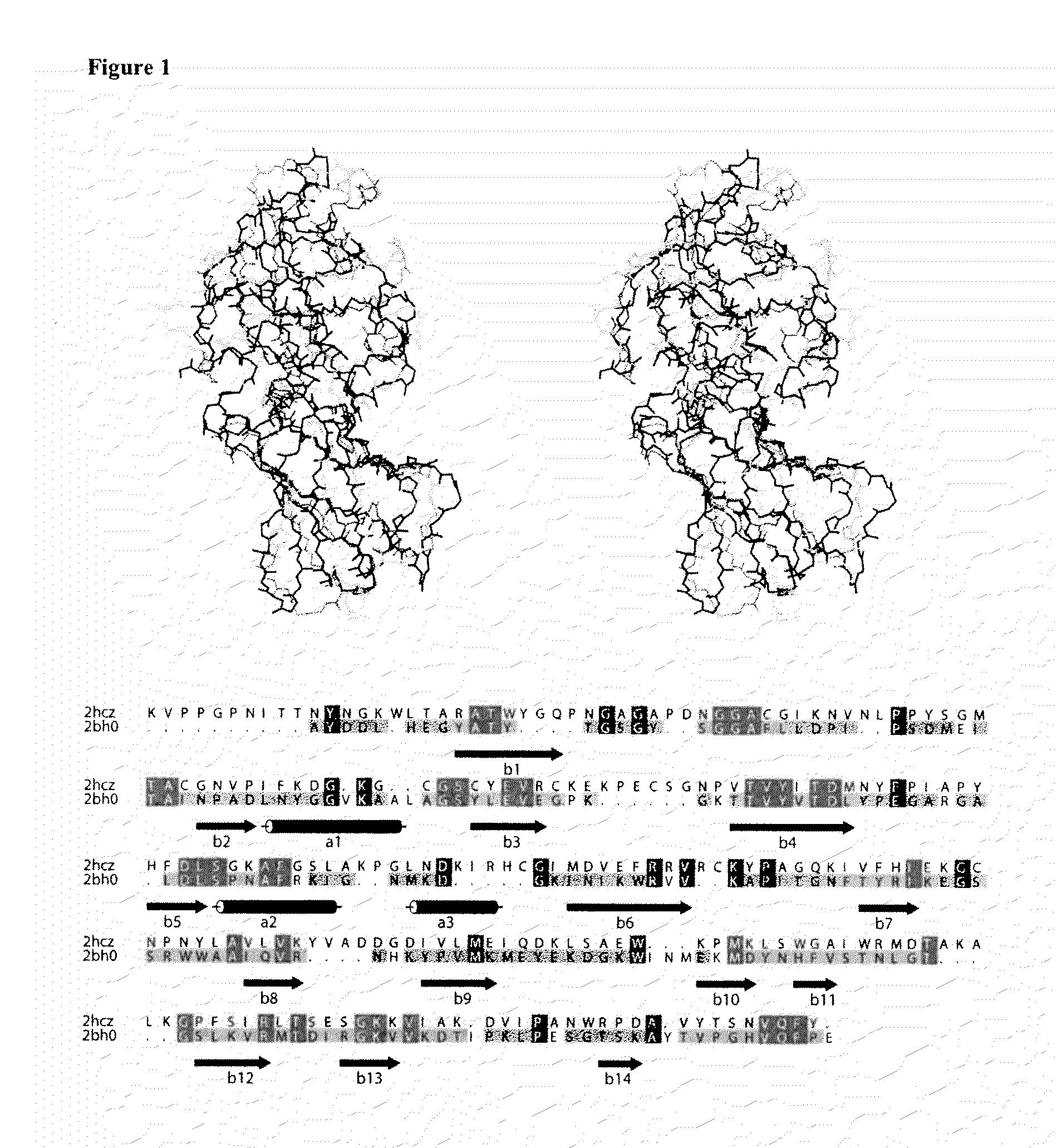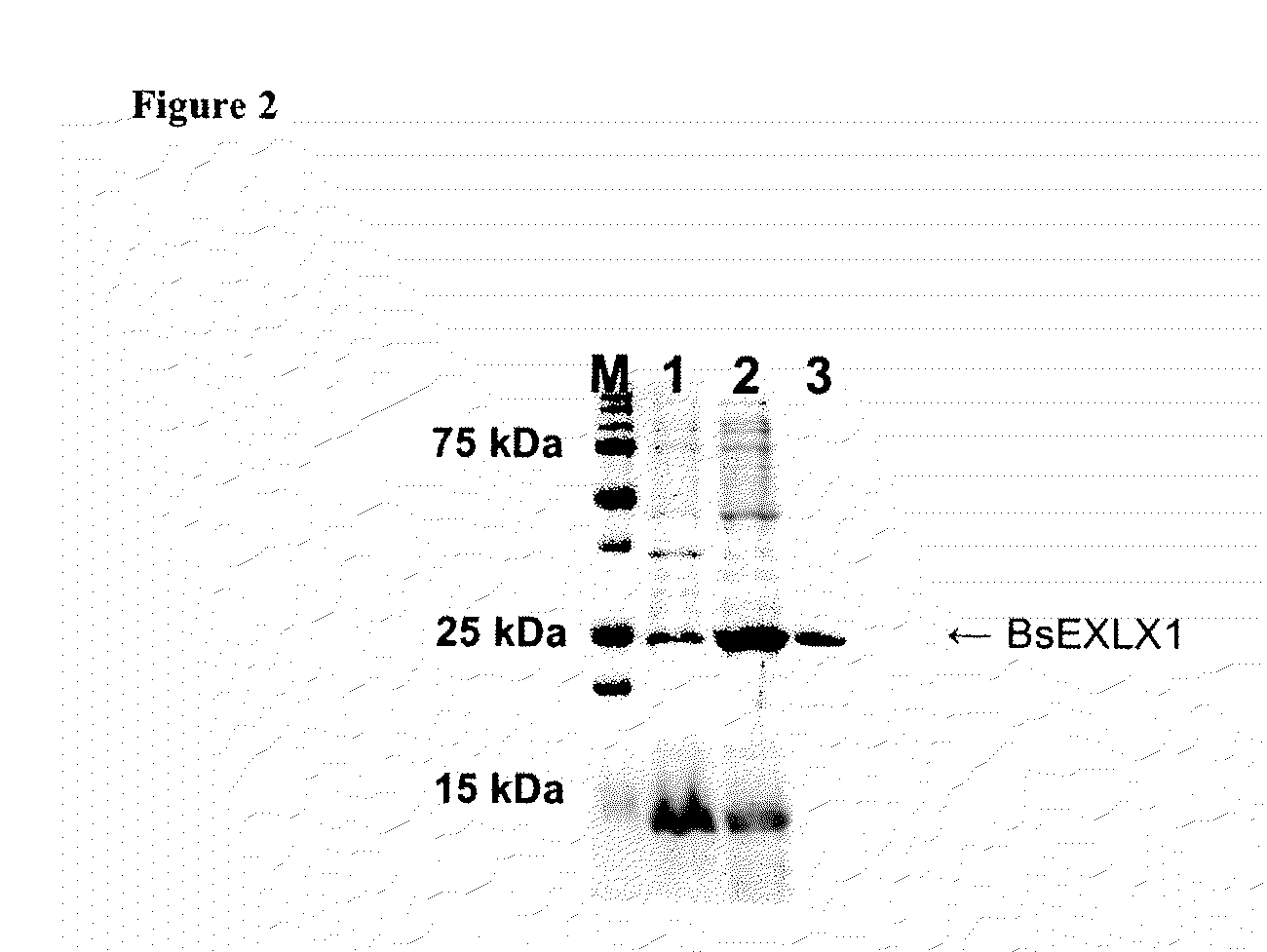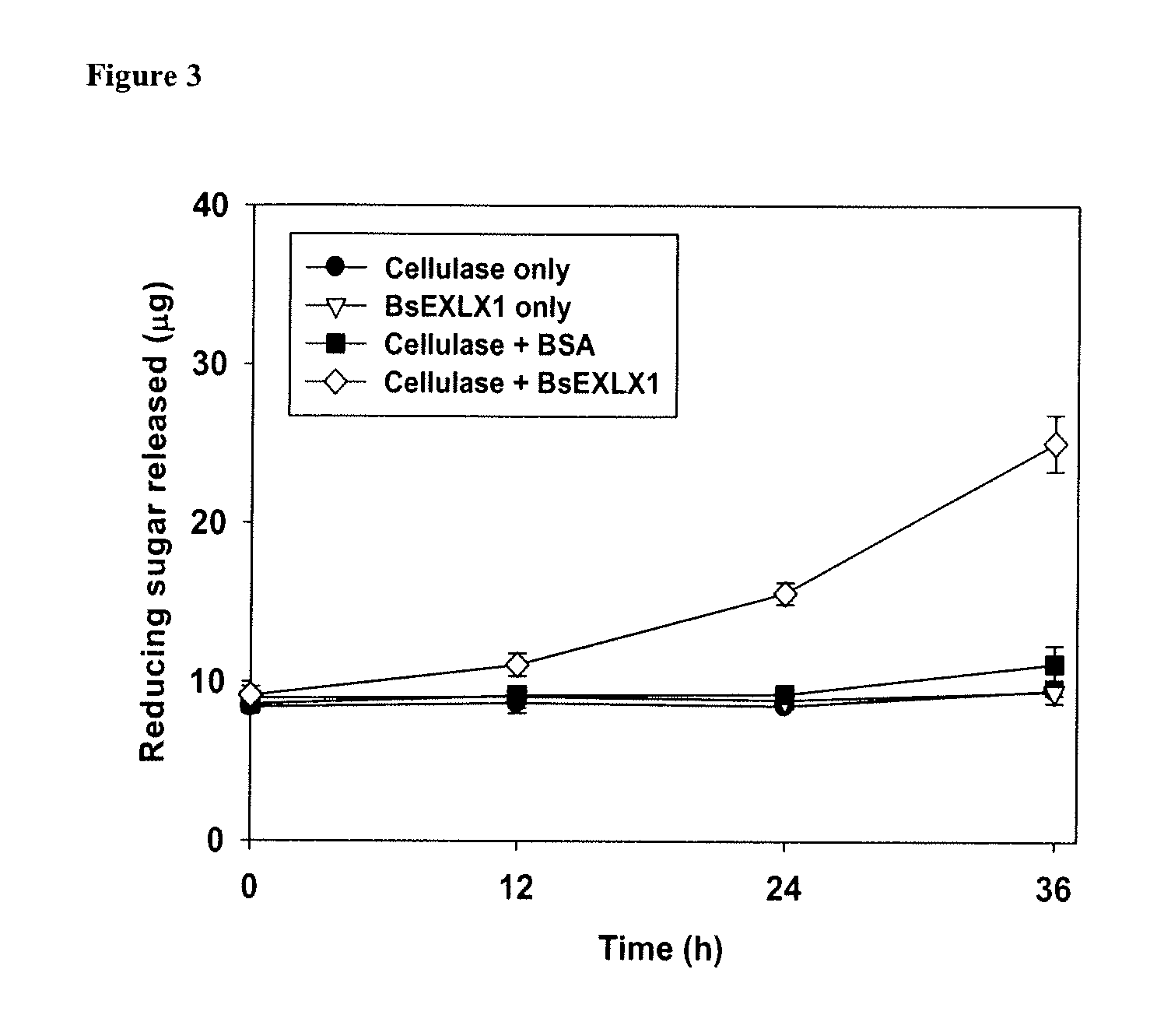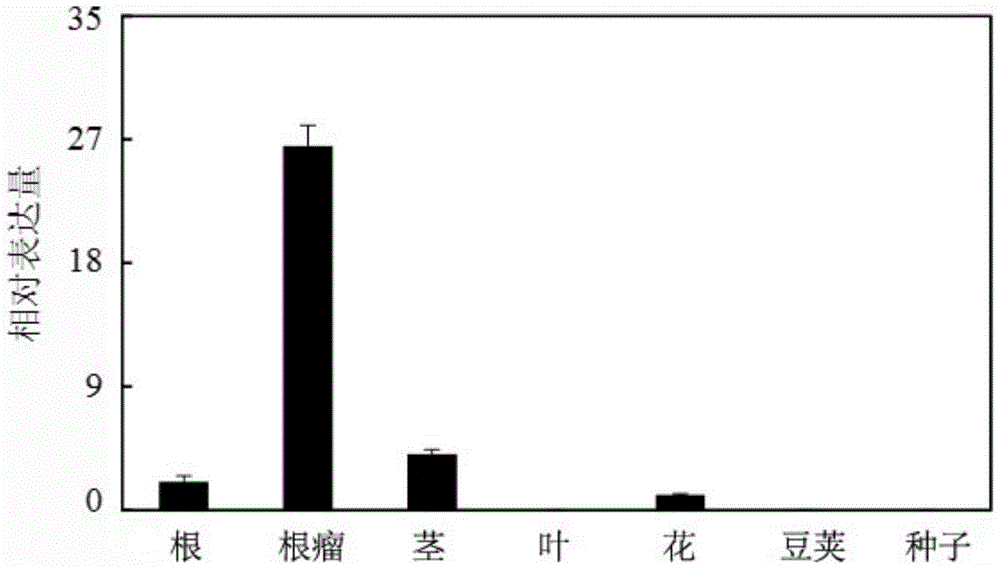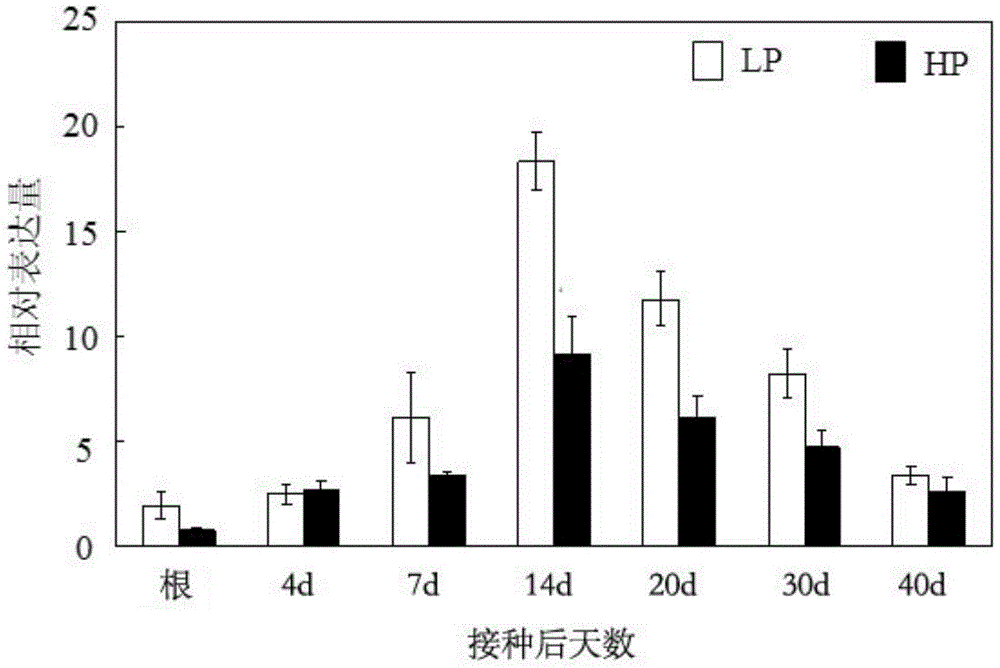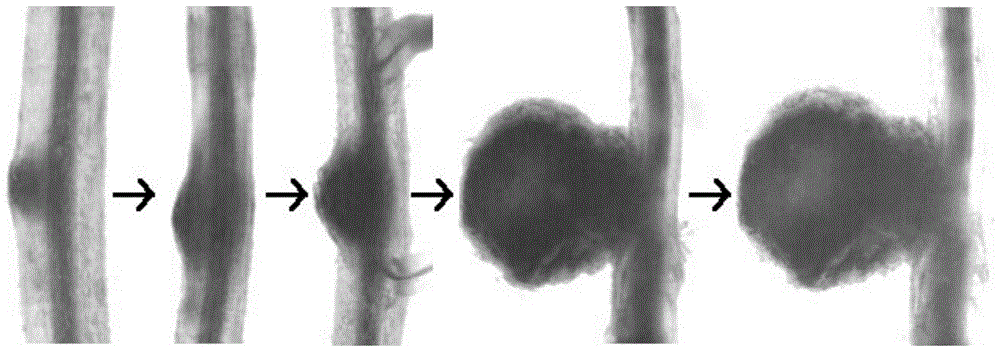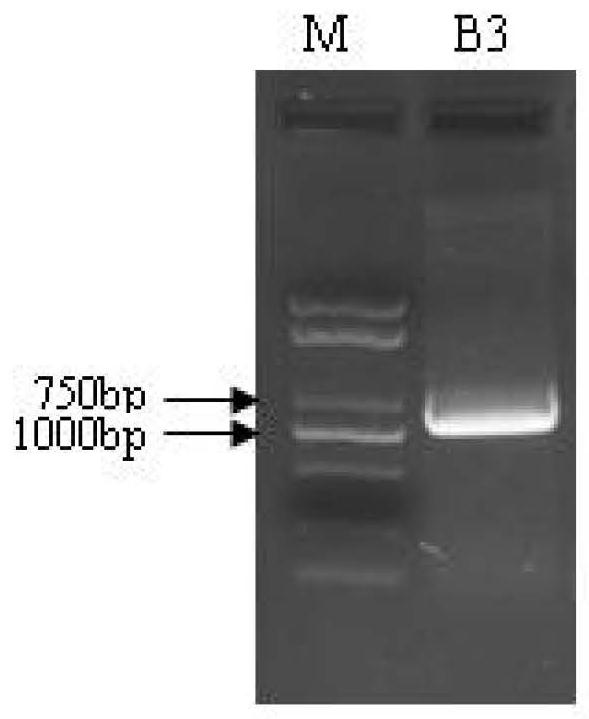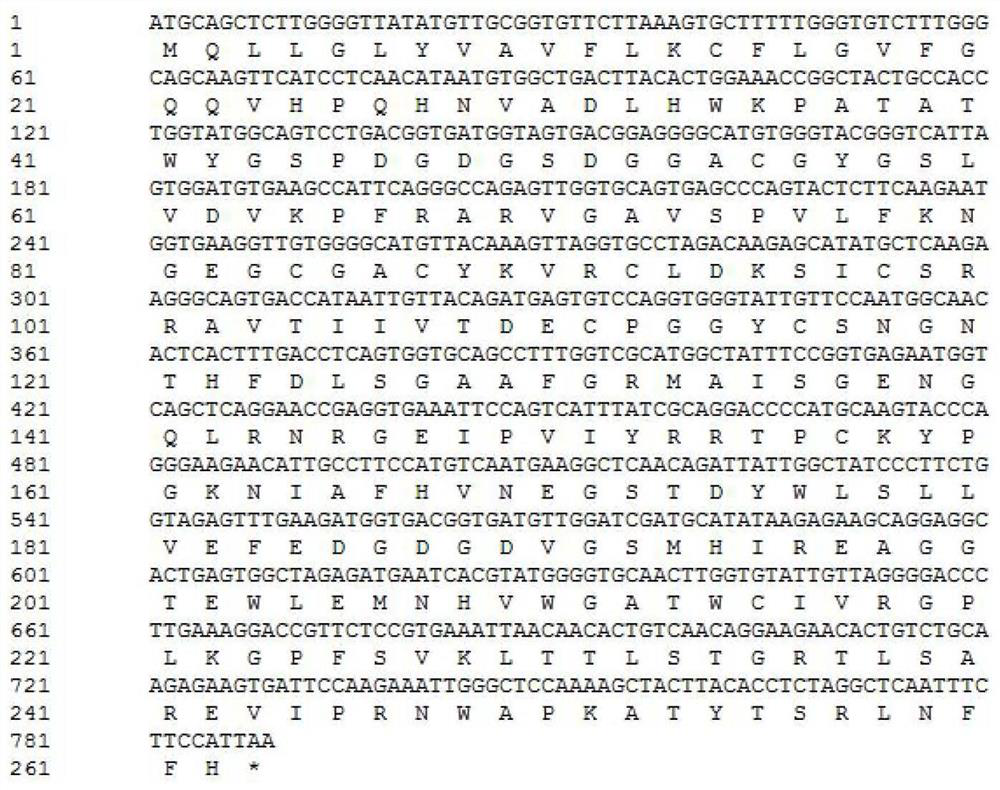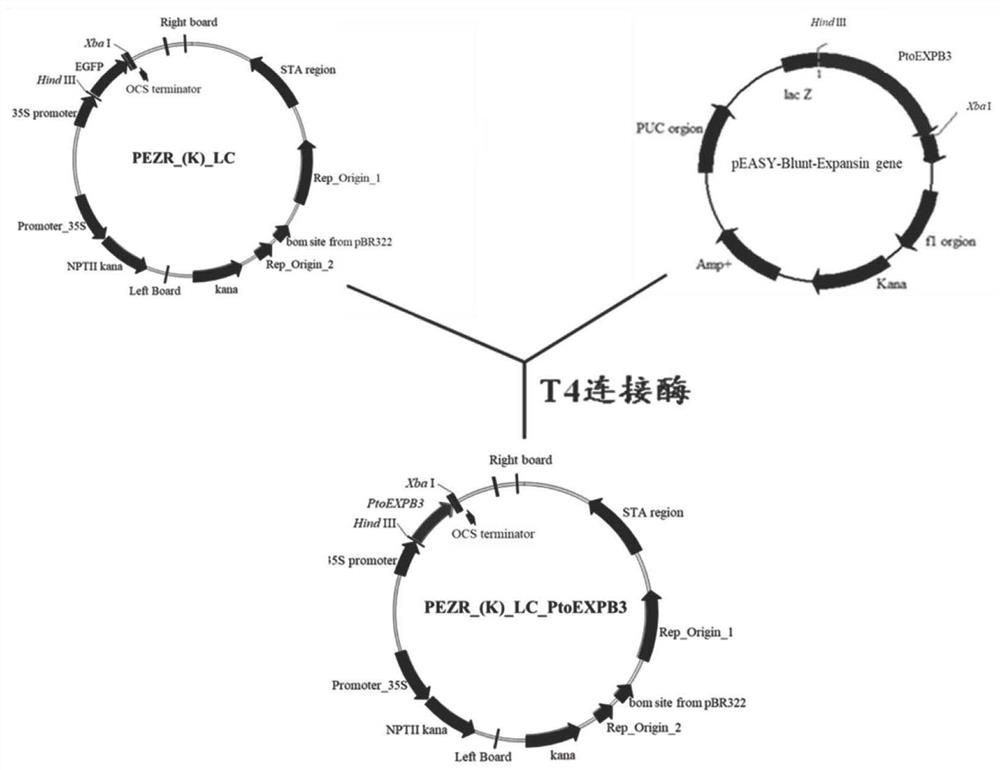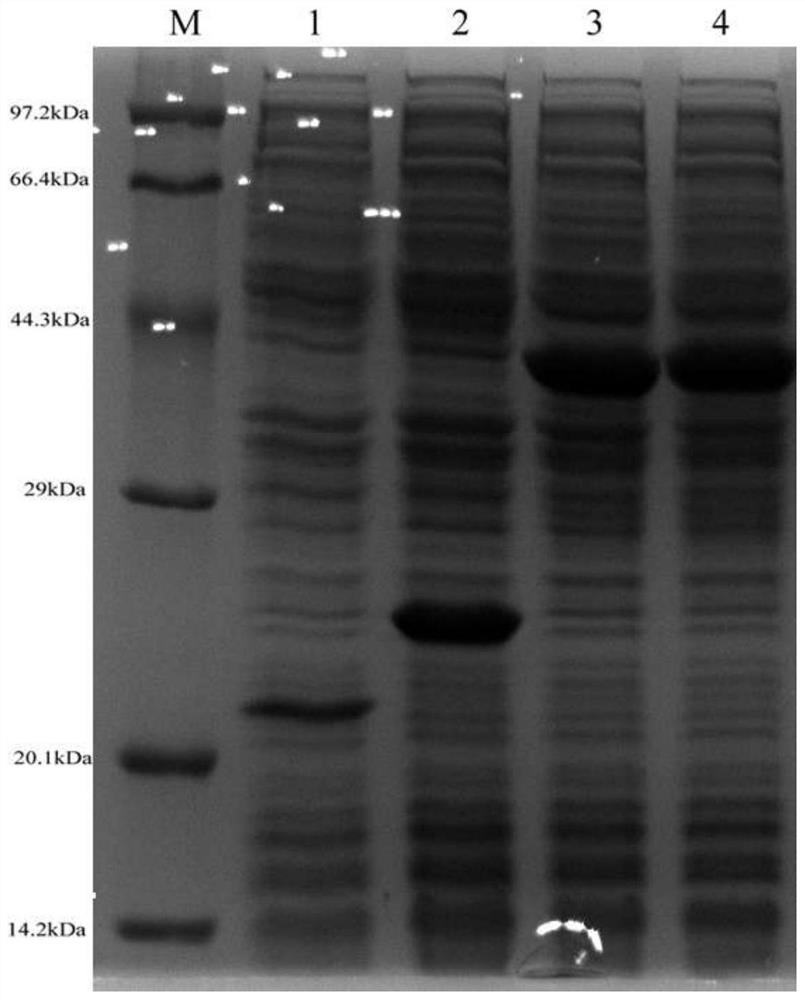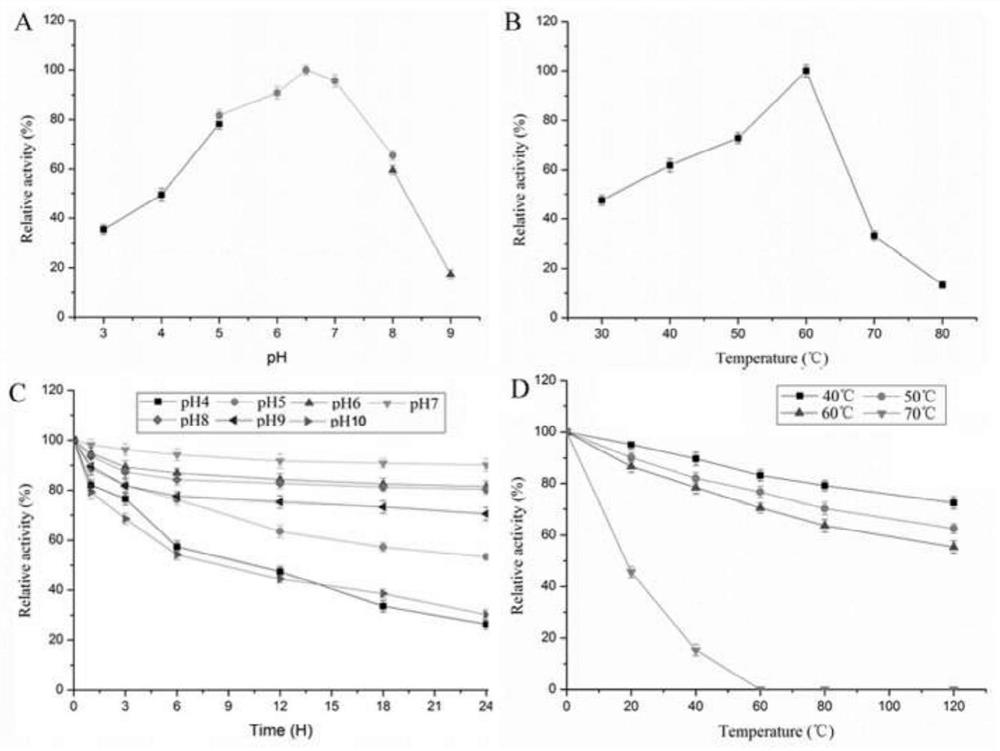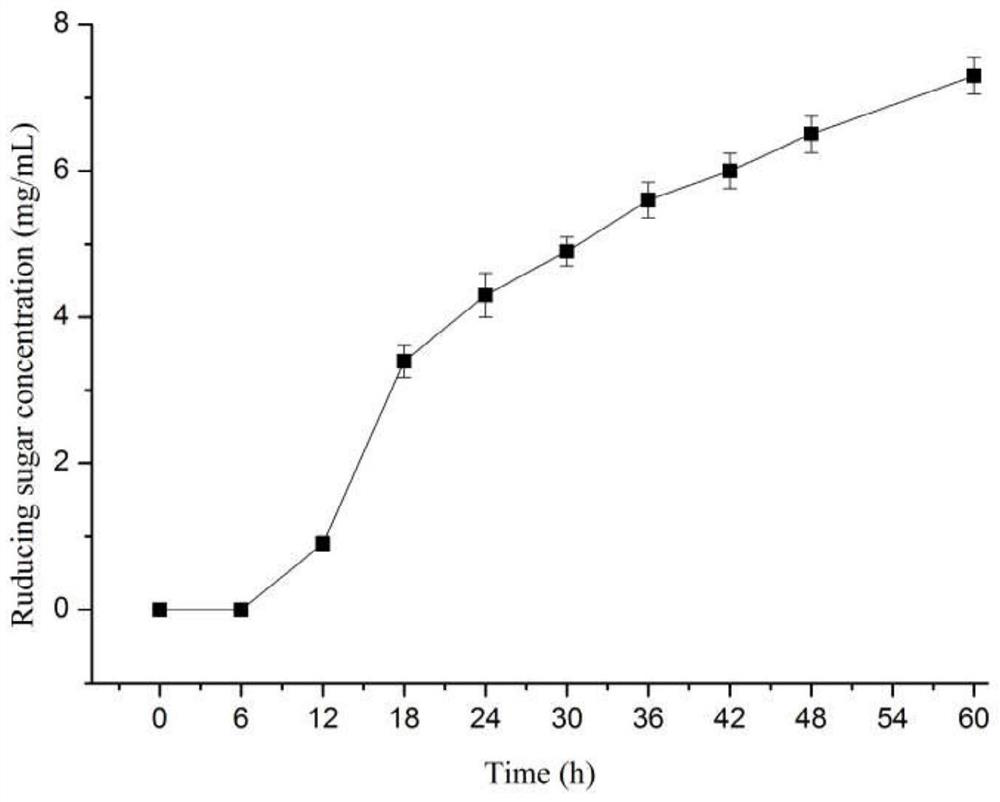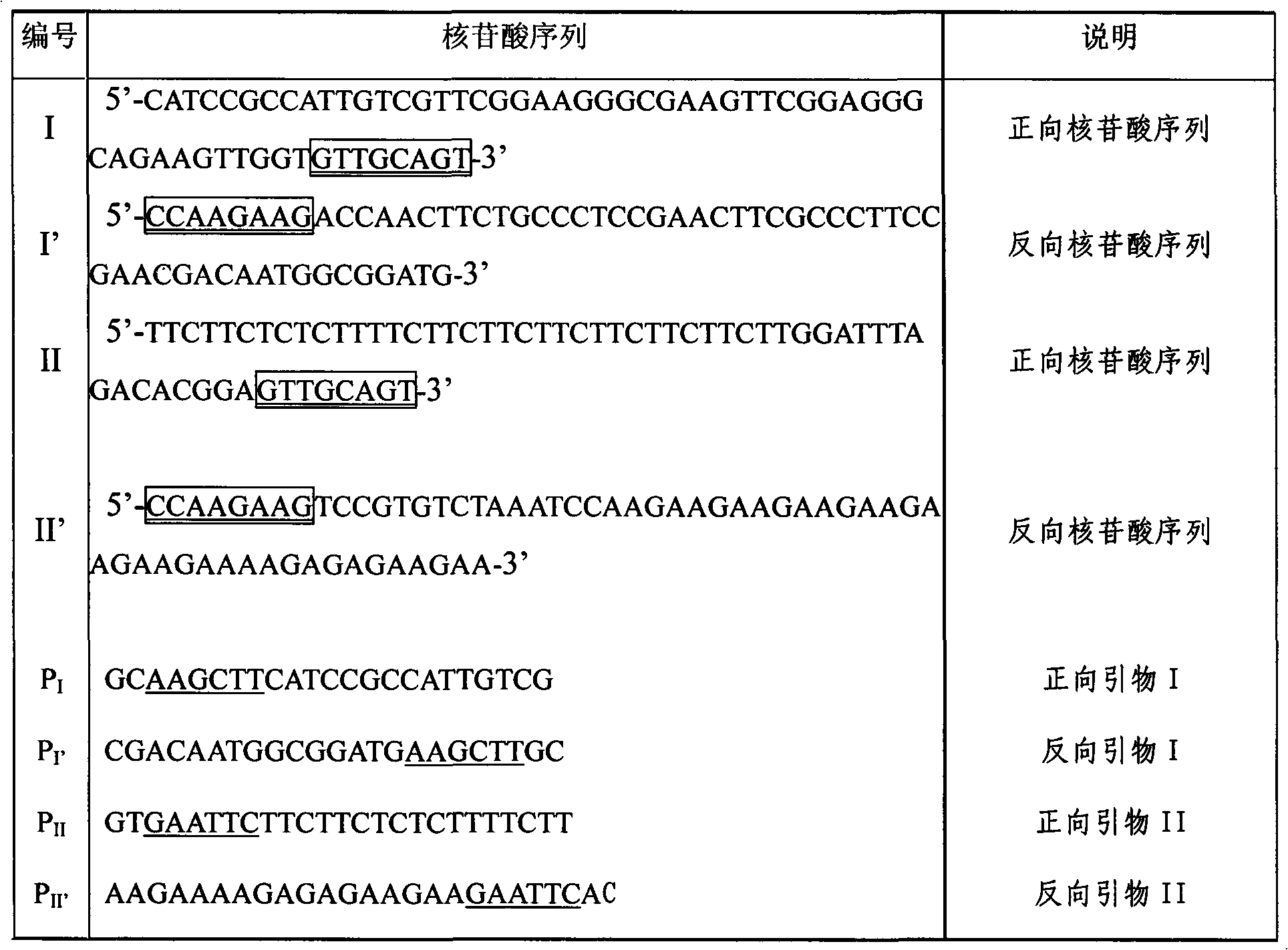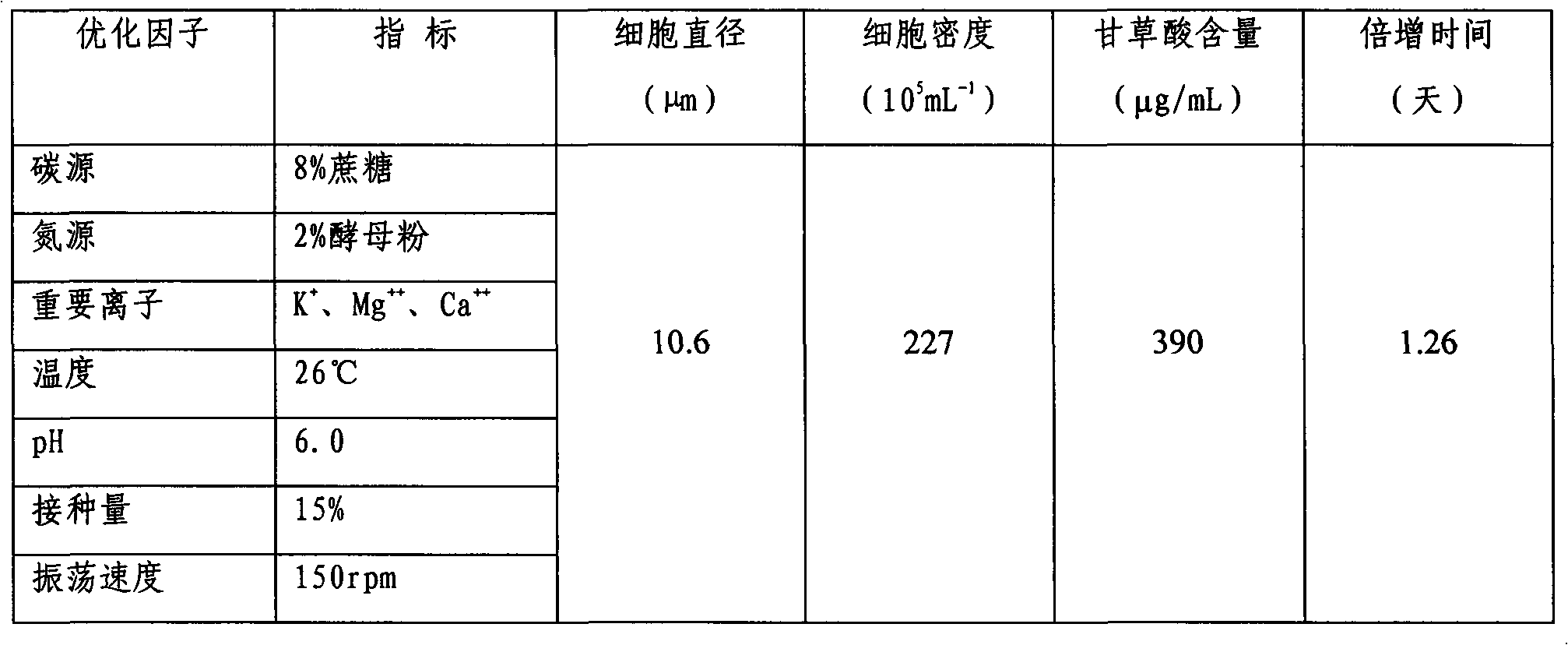Patents
Literature
Hiro is an intelligent assistant for R&D personnel, combined with Patent DNA, to facilitate innovative research.
51 results about "Expansin" patented technology
Efficacy Topic
Property
Owner
Technical Advancement
Application Domain
Technology Topic
Technology Field Word
Patent Country/Region
Patent Type
Patent Status
Application Year
Inventor
Expansin refers to a family of closely related nonenzymatic proteins found in the plant cell wall, with important roles in plant cell growth, fruit softening, abscission, emergence of root hairs, pollen tube invasion of the stigma and style, meristem function, and other developmental processes where cell wall loosening occurs. Expansins were originally discovered as mediators of acid growth, which refers to the widespread characteristic of growing plant cell walls to expand faster at low (acidic) pH than at neutral pH. Expansins are thus linked to auxin action. They are also linked to cell enlargement and cell wall changes induced by other plant hormones such as gibberellin, cytokinin, ethylene and brassinosteroids.
Enhancement of accessibility of cellulose by expansins
InactiveUS6326470B1Protein composition from vegetable seedsClimate change adaptationCellulosePlant cell
Plant cell expansion is regulated by wall relaxation and yielding, which is thought to be catalyzed by elusive "wall loosening" enzymes. By employing a reconstitution approach, we initially found that a crude protein extract from the cell walls of growing cucumber seedlings possessed the ability to induce the extension of isolated cell walls. This activity was restricted to the growing region of the stem and could induce the extension of isolated cell walls from various dicots and monocots, but was less effective on grass coleoptile walls. Sequential HPLC fractionation of the active wall extract revealed two proteins with molecular masses of 29 and 30 kD, as measured by SDS-PAGE, associated with such activity. Each protein, by itself, could induce wall extension without detectable hydrolytic breakdown of the wall. We proposed the name "expansins" for this class of proteins. Expansins have been isolated from various plant sources including oat, cucumber, broccoli, celery, tomato, cotton, cabbage, and corn, and also from snail and its feces. These proteins weaken the intermolecular bonds between plant wall polysaccharides. They decrease the mechanical strength of commercial products made from polysaccharides, such as paper, and therefore present a novel approach in developing new technologies in industries which make use of such polysaccharides, such as in the paper industry, in the applications of polysaccharide gums and related products. These proteins moreover present a novel approach in the control of plant growth.
Owner:PENN STATE RES FOUND
Bioengineering cotton fiber properties
InactiveUS7060874B2Increase heightTransferasesFermentationPyruvate carboxylasePhosphoenolpyruvate carboxylase
The present invention provides plant fiber expansion (FE) genes that encode FE polypeptides, such as phosphoenol pyruvate carboxylase (PEPcase), expansin, endoglucanase, xyloglucan endoglycosyltransferase (XET), and pectin methyl esterase (PME). The invention further provides fiber-specific promoters. Still further, the invention provides molecular strategies for modulating fiber quality and yield in fiber producing plants by modulating expression of FE genes or mutant forms of FE genes.
Owner:RGT UNIV OF CALIFORNIA
Effective antioxidation method for ganoderma lucidum spore powder
InactiveCN102600213APrevent oxidationReduce oxidationMetabolism disorderPharmaceutical non-active ingredientsBiotechnologySpore
The invention provides a biological sporoderm-breaking technology and an effective antioxidation method for ganoderma lucidum spore powder. Firstly, full mature ganoderma lucidum spores are screened and put into water to be cleaned, then the ganoderma lucidum spores are heated after being frozen, spore enzymolysis and sporoderm breaking are carried out with one of expansin, cellulose, lysozyme, helicase and the like or the mixture of a plurality of enzymes for 3-24 hours at the temperature of 37-45 DEG C, pH (Potential Of Hydrogen) is regulated to 5.5-6.8 by citric acid, and then a vitamin C is used as an antioxidant of the ganoderma lucidum spore powder. Finally, 1% of sweetener-stevioside is used for removing bitter, and treatment with an instantaneous ultra-high temperature sterilization machine and bagging are carried out. The method disclosed by the invention has a good sterilization effect and high sporoderm breaking efficiency, is low in cost, does not break protoplasm of the ganoderma lucidum spore powder and keeps the original characteristics of the ganoderma lucidum powder.
Owner:CHONGQING UNIV OF POSTS & TELECOMM
Liquid fermentation method for improving yield of cordyceps sinensis polysaccharide by utilizing expansin
The invention relates to a liquid fermentation method for improving yield of cordyceps sinensis polysaccharide by utilizing expansin. The liquid fermentation method includes inoculating cordyceps militaris strains to a PD liquid fermentation medium for activated culture, inoculating the strains to a strain fermentation medium with 10-15% inoculum amount for strain culture to obtain a strain liquid; inoculating the strain liquid to the liquid fermentation medium for liquid culture, adding an expensin solution for continuous culture, separating the liquid to obtain cordyceps militaris mycelium and a fermentation broth; extracting cordyceps militaris extracellular polysaccharide from the fermentation broth, extracting cordyceps militaris intracellular polysaccharide from the cordyceps militaris mycelium, and mixing the cordyceps militaris extracellular polysaccharide and the cordyceps militaris intracellular polysaccharide to obtain the cordyceps sinensis polysaccharide. According to the liquid fermentation method for improving the yield of the cordyceps sinensis polysaccharide by utilizing the expansin, the expansin is applied to liquid fermentation production of the cordyceps militaris polysaccharide, compared with the prior art, yields of the intracellular polysaccharide and the extracellular polysaccharide are improved by more than 1.5 times and 6.9 times respectively, and the industrial application prospect is bright.
Owner:INST OF AGRI RESOURCES & ENVIRONMENT SHANDONG ACADEMY OF AGRI SCI
Cotton drought resistant gene GhEXP1 and applications thereof
InactiveCN104988159AReduced drought toleranceEasy to understandPlant peptidesFermentationAgricultural scienceResistant genes
The invention relates to a cotton drought resistant gene GhEXP1 and applications thereof, and belongs to the biology technical field. The related gene GhEXP1 is a cotton expansin gene and is reported for the first time. The gene is cloned from an upland cotton draught resistant species (Ao 3503), and through RT-PCR analysis, people find that the expression of GhEXP1 is up-regulated after a drought treatment. The drought resistant performance of strains containing silenced GhEXP1 gene is obviously reduced. The living rate of GhEXP1 transgene arabidopsis plants is 80% after a 30-day drought treatment; while the living rate of referential wild arabidopsis is 10%; and the result shows that the GhEXP1 gene can prominently improve the drought resistant performance of plants. The GhEXP1 gene is advantageously used for improving the plant drought resistance and has a wide application prospect.
Owner:JIANGSU ACADEMY OF AGRICULTURAL SCIENCES
Expansin polynucleotides, related polypeptides and methods of use
Owner:PENN STATE RES FOUND
Microbial swollenin protein, DNA sequences encoding such swollenins and method of producing such swollenins
InactiveUS6967246B2High nutritional valueFabric strength lossFungiNon-fibrous pulp additionBiotechnologyMicroorganism
A novel microbial protein is described which appears to have significant homology to plant expansin proteins and has the ability to weaken filter paper and swell cellulose. A DNA is described which encodes the novel protein.
Owner:GENENCOR INT INC
Mutant microorganism belonging to the genus trichoderma and method for producing protein using the same
InactiveUS20140045214A1Improve production efficiencyMicroorganismsPlant peptidesMicroorganismNucleotide
An object of the present invention is to provide a mutant microorganism belonging to the genus Trichoderma capable of secretory production of a protein of interest using a microorganism belonging to the genus Trichoderma as a host. The mutant microorganism belonging to the genus Trichoderma of the present invention is obtained by transforming a microorganism belonging to the genus Trichoderma with a polynucleotide encoding a maize-derived expansin signal peptide and a protein of interest.
Owner:TOYOTA JIDOSHA KK
Microbial swollenin protein, DNA sequences encoding such swollenins and method of producing such swoolenins
A novel microbial protein is described which appears to have significant homology to plant expansin proteins and has the ability to weaken filter paper and swell cellulose. A DNA is described which encodes the novel protein.
Owner:GENENCOR INT INC
Millettia specisoa champ seed large-scale seedling growing method
InactiveCN106856703ARealize large-scale seedling cultivationTroubleshooting Irregular GerminationSeed and root treatmentPlant protective coveringsExpansinBud
The invention relates to a millettia specisoa champ seed large-scale seedling growing method. The method comprises the steps of seed pretreatment, seed sowing, support putting up and seedling trimming, wherein in the step of seed pretreatment, a base fertilizer is mixed with soil, in the step of seed planting, a root stabilizing solution and urea liquid are sprayed, and then topdressing is performed, in the step of support putting up, wood bars or bamboo canes are utilized to make the millettia specisoa champ support, and then blade surface expansin is sprayed, and in the step of seedling trimming, further growth of millettia specisoa champ is promoted. The millettia specisoa champ seed large-scale seedling growing method has the advantages that buds are ordered, the seedlings are robust, the seedling growing success rate is high, the seedling growing time is short, and the seedling growing cost is low.
Owner:广西蚕越农业有限责任公司
Method for producing laccase by means of liquid fermentation of lentinus edodes
ActiveUS20140363874A1Non-toxicLow raw material costFungiOxidoreductasesExpansinBiological activation
A method for producing laccase by liquid fermentation of Lentinus edodes comprises the following steps of: (1) inoculating strains of Lentinus edodes into the PD liquid fermentation medium to perform activation culture and obtain a seed liquid; (2) inoculating the seed solution into a liquid fermentation medium to perform liquid fermentation culture, then adding an expansin solution to perform further culture, separating the supernatant to obtain a ferment solution; (3) extracting laccase from the ferment solution. A plant expansin and an optimized fermentation method are applied for producing laccase by liquid fermentation of Lentinus edodes, which increases the liquid fermentation output of laccase of Lentinus edodes remarkably, by more than 3 times in comparing with traditional fermentation production methods.
Owner:INST OF AGRI RESOURCES & ENVIRONMENT SHANDONG ACADEMY OF AGRI SCI
Preparation method and application of water-soluble water flush fertilizer for controlling soil-borne diseases and promoting crop growth
InactiveCN109627093AEffective controlGood fertilizer effectMagnesium fertilisersAnimal corpse fertilisersDiseaseFeces
The invention discloses a preparation method and application of a water-soluble water flush fertilizer for controlling soil-borne diseases and promoting crop growth. The fertilizer comprises, by weight, 17-21 parts of diammonium phosphate, 12-16 parts of potassium sulfate, 14-18 parts of straw, 13-17 parts of boric acid, 12-16 parts of magnesium sulfate, 9-13 parts of ferrous sulfate, 16-20 partsof animal waste, 18-22 parts of bentonite, 24-28 parts of urea, 19-23 parts of charcoal ash, 31-35 parts of seafood shells, 13-17 parts of indolebutyric acid, 7-11 parts of natural brassinolide, 16-20parts of expansin, 20-24 parts of chitosan oligosaccharide, 9-13 parts of lignin, 18-22 parts of bamboo vinegar, 19-23 parts of glucose and an appropriate amount of water. The fertilizer has high practicability, provides nutrients required for crop growth, has high fertilizer efficiency and can effectively control soil-borne diseases.
Owner:袁大高科(海南)农业发展有限公司
Recombinant vector containing tomato leexp2 gene, recombinant bacteria and expression of leexp2 gene in recombinant bacteria
InactiveCN102286520AImprove the efficiency of reducing sugarAvoid pollutionFungiMicroorganism based processesYeastProtein target
The invention discloses a recombinant vector and recombinant bacterium containing tomato LeEXP2 gene, and expression of the LeEXP2 gene in the recombinant bacterium. In the invention, the LeEXP2 gene is firstly cloned from the tomato; the LeEXP2 gene is further constructed to a Pichia pastoris expression vector; a recombinant Pichia pastoris bacterium containing tomato LeEXP2 gene is obtained by electrotransformation; and the tomato LeEXP2 gene is induced to express in the recombinant Pichia pastoris bacterium. The recombinant bacterium disclosed by the invention can effectively express the target protein LeEXP2. The invention overcomes the defect that the limited amount of expansin purified from the plants in the prior art can not be massively applied to cellulose degradation. Many wastelignocelluloses exist in the natural world; and the LeEXP2 protein obtained in the invention can enhance the cellulose degradation efficiency of cellulase, and has an important meaning for cleanly and effectively utilizing waste celluloses and solving the current energy crisis.
Owner:TIANJIN UNIV
Immobilized xylanase, preparation method and application of immobilized xylanase
InactiveCN109400715AStrong affinity adsorptionEasy accessAntibody mimetics/scaffoldsFermentationSpecific adsorptionPhosphate
The invention provides immobilized xylanase, a preparation method and application of the immobilized xylanase, and relates to the field of genetic engineering and enzyme engineering. The immobilized xylanase is obtained by immobilizing expansin-xylanase fusion protein on corncob residues. The preparation method of the immobilized xylanase comprises the following steps: immobilizing the expansin-xylanase fusion protein by using the corncob residues subjected to alkali treatment; and when preparing xylooligosaccharide from the immobilized xylanase, adding xylan and the immobilized xylanase in phosphate buffer, carrying out oscillatory reaction for 18-36 h at the temperature of 30-60 DEG C, centrifuging and then taking supernatant which is the xylooligosaccharide. According to the immobilizedxylanase, the fusion protein is immobilized on the corncob residues by the specific adsorption ability of expansin, a carrier is obtained easily, the cost is low, an immobilizing process is simple, consumed time is short, and when the xylooligosaccharide is prepared, operation is simple, and reaction conditions are mild.
Owner:NANJING UNIV OF TECH +2
Purified plant expansin proteins and DNA encoding same
This invention relates to a new class of proteins called expansins, and methods related thereto are presented. This class of proteins can be characterized as catalysts of the extension of plant cell walls and the weakening of the hydrogen bonds in pure cellulose. Two proteins have been isolated from washed wall fragments of cucumber hypocotyls, referred to as “cucumber expansin-29” and “cucumber expansin-30”. Moreover, three peptide fragments from the purified cEx-29 protein were sequenced, then oligonucleotide primers were designed to amplify a portion of the expansin cDNA using polymerase chain reaction with a cDNA template derived from cucumber seedlings, and then the PCR fragment was used to screen a cDNA library to identify full length clones. Another expansin protein has been isolated from oat coleoptiles (oat expansin oEx-29), while three additional expansin sequences have been identified in Arabidopsis and an additional two in rice.
Owner:PENN STATE RES FOUND
Promoter for plant gene specifically expressed in stoma and vascular bundle
InactiveCN102311955APlant trait improvementVector-based foreign material introductionAngiosperms/flowering plantsVascular bundleStoma
The invention discloses a promoter sequence for a gene specifically expressed in a stoma and a vascular bundle of a plant. The invention provides a promoter sequence of a Brassica juncea expansin gene (BjEXPA1) cloned by utilizing a genomic deoxyribonucleic acid (DNA) walking method, which is capable of driving a reporter gene to be specifically expressed in the stoma and the vascular bundle; the BjEXPA1 promoter sequence is fused with beta-glucuronidase (gus) gene to construct a plant expression vector; and the constructed recombinant vector is utilized to transform tobacco and arabidopsis to detect an obtained transgenic plant, and shown by a result, the BjEXPA1 promoter is capable of driving the GUS reporter gene to be expressed in the stoma and the vascular bundle of the plant.
Owner:GRADUATE SCHOOL OF THE CHINESE ACAD OF SCI GSCAS
Novel expansin polynucleotides, related polypeptides and methods of use
The present invention relates to beta expansin polypeptides, nucleotide sequences encoding the same and regulatory elements and their use in altering cell wall structure in plants. Nucleic acid constructs comprising a beta expansin sequence operably linked to a promoter, or other regulatory sequence are disclosed as well as vectors, plant cells, plants, and transformed seeds containing such constructs are provided. Methods for the use of such constructs in repressing or inducing expression of a beta expansin sequences in a plant are also provided as well as methods for harvesting transgenic expansin proteins. In addition, methods are provided for inhibiting or improving cell wall structure in plants by repression or induction of expansin sequences in plants.
Owner:PENN STATE RES FOUND
Promoter of wheat root specific expression expansin gene and application thereof
InactiveCN104928293AVector-based foreign material introductionAngiosperms/flowering plantsBiotechnologyExpansin
The invention relates to a promoter of a wheat root specific expression expansin gene and an application thereof. The invention aims at providing a promoter of specific expression in a monocotyledon root (especially in root hair). The promoter promotes the specific expression of a target gene in the root. The promoter can be fused with salt-resistant, anti-drought and root secretory protein genes to form a root specific expression carrier, and important significance for breeding of the salt-resistant and anti-drought gene engineering of plants and especially wheat as well as obtaining a root specific expression protein product can be realized.
Owner:UNIV OF JINAN
Method for increasing yield of total flavonoids in ganoderma lucidum mycelium
A method for increasing the yield of total flavonoids in Ganoderma lucidum mycelium by an expansin comprises: (1) inoculating Ganoderma lucidum into the PD liquid fermentation medium, activating the culturing of the strains and obtaining a seed solution; (2) inoculating the seed solution into a liquid fermentation medium, culturing and adding the expansin solution, then further culturing, isolating and obtaining Ganoderma lucidum mycelium; (3) extracting flavonoids from the Ganoderma lucidum mycelium and obtaining total flavonoids. A plant expansin is used for the liquid fermentation production of flavonoids ingredients of Ganoderma lucidum, and the fermentation process and extraction method are optimized to increase greatly the yield of total flavonoids in Ganoderma lucidum.
Owner:INST OF AGRI RESOURCES & ENVIRONMENT SHANDONG ACADEMY OF AGRI SCI +1
Method for producing laccase by means of liquid fermentation of Lentinus edodes
A method for producing laccase by liquid fermentation of Lentinus edodes comprises the following steps of: (1) inoculating strains of Lentinus edodes into the PD liquid fermentation medium to perform activation culture and obtain a seed liquid; (2) inoculating the seed solution into a liquid fermentation medium to perform liquid fermentation culture, then adding an expansin solution to perform further culture, separating the supernatant to obtain a ferment solution; (3) extracting laccase from the ferment solution. A plant expansin and an optimized fermentation method are applied for producing laccase by liquid fermentation of Lentinus edodes, which increases the liquid fermentation output of laccase of Lentinus edodes remarkably, by more than 3 times in comparing with traditional fermentation production methods.
Owner:INST OF AGRI RESOURCES & ENVIRONMENT SHANDONG ACADEMY OF AGRI SCI
Special organic fertilizer for konjak
InactiveCN110183255AEasy to producePromote incomeBio-organic fraction processingExcrement fertilisersFiberDisease
The invention relates to the technical field of konjak planting and discloses a special organic fertilizer for konjak. The special organic fertilizer comprises the following raw materials in parts byweight: 150-180 parts of pig manure, 40-60 parts of cow dung, 30-35 parts of konjak leaves, 10-20 parts of ammonium bicarbonate, 30-50 parts of a composite fertilizer, 10-15 parts of a boron-zinc-magnesium fertilizer, 1-2 parts of composting bacteria, 1-2 parts of crude fiber degrading bacteria, 5-10 parts of potassium sulfate and 5-8 parts of expansin. A method for producing the special organic fertilizer for konjak by using the formula specifically comprises the following steps: crushing the konjak leaves, mixing the konjak leaves with the pig manure and the cow dung according to a weight part ratio, adding the composting bacteria of a same ratio, putting the mixture into a tank for fermentation by using a forklift, carrying out fermentation for 15-20 days, and carrying out turning, wherein the composting fermentation temperature is 45-65 DEG C. The special organic fertilizer for konjak is simple in production procedure, reasonable in cost, considerable in konjak benefit and capableof effectively preventing and treating diseases and insects at a rapid expanding phase of konjak, increasing the harvesting yield of konjak, reducing resource waste and accelerating growth of konjak seedlings at a seedling growth phase as well.
Owner:云南谷力果力农业科技有限公司
Cultivation method for decreasing super sweet grape shattering
InactiveCN104982297AReduce grain shatteringAlleviate shatteringGraftingCultivating equipmentsComing outExpansin
The invention discloses a cultivation method for decreasing super sweet grape shattering, which belongs to cultivation technology field. The method comprises the steps of a. adopting 5BB stock to graft the super sweet grape sprouts; b. performing protective cultivation by using a protective cultivation way, and applying bio fungus organic fertilizer during the cultivation period; c. planting 400-600 grapes every Mu in V- pruning way; d. pinching before the florescence; e. spraying PBO foliar fertilizer during the florescence; f. spraying a fruit-keeping agent when the florescence comes to an end; g. dipping the clusters with an expansin within a month after the fruits come out, and thinning the fruits immediately after dipping the clusters; and h. putting a bag thereon. The invention discloses the key technology for decreasing super sweet grape shattering effectively in every stage based on the basic characteristics; and the measures for decreasing super sweet grape shattering at each stage are adopted so as to decrease shattering. Also, the economic benefit is greatly increased.
Owner:ZIBO HUILONG AGRI DEV CO LTD
Prokaryotic expansin protein activating cellulose expansion and cellulose - degrading composition comprising the same
InactiveUS20100173386A1High yieldImprove abilitiesCellulosic pulp after-treatmentHydrolasesFiberExpansin
Provided is a prokaryotic expansin protein capable of expanding cellulose. The prokaryotic expansin protein performs the same function as existing plant expansin proteins. The prokaryotic expansin protein can be produced at greatly reduced cost on an industrial scale, unlike plant expansin proteins. Particularly, when lignocellulosic biomass is hydrolyzed into glucose using the prokaryotic expansin protein and cellulase, the hydrolysis rate of cellulose can be markedly increased by the cellulase, resulting in improved yield of the glucose. In actuality, the use of the prokaryotic expansin enables the production of bioenergy at low cost with a reduced amount of enzyme used. The prokaryotic expansin protein softens the textures of pulp, cotton fibers (e.g., jeans), etc. Therefore, the prokaryotic expansin protein can be used for various purposes, such as biopulping and biostoning.
Owner:KOREA UNIV IND & ACADEMIC CALLABORATION FOUND
New application of cell wall expansion protein gene gmexpb6
InactiveCN104651374BIncrease the number of nodulesWeight increaseFermentationVector-based foreign material introductionPlant noduleExpansin
The invention discloses new application of a cell wall expansin gene GmEXPB6, and particularly discloses new application of the GmEXPB6 gene on the aspects of promoting the biological nitrogen fixation of a leguminous plant and improving the nitrogen fixation efficiency. The inventors clone the gene GmEXPB6 with low-phosphorous enhancement and root nodule high expression through a quantitative PCR result and prove that the protein coded by the GmEXPB6 gene has the functions of promoting root nodule expansion, enhancing the root nodule nitrogenase activity and the like, and the root nodule nitrogen fixation efficiency and biomass of a transgenic compound plant are finally improved through GmEXPB6 overexpression. The study of the inventors can provide the gene resource for the nitrogen high-efficiency and high-yield molecule breeding of crops which include soybeans, and has important theoretical and practical significance on developing environmental-friendly sustainable agriculture.
Owner:SOUTH CHINA AGRI UNIV
A protein related to plant flowering time and its application
ActiveCN111620936BIncrease valueEarly floweringPlant peptidesFermentationBiotechnologyNicotiana tabacum
The present invention relates to a protein related to plant flowering time and its application. Said protein is the following protein of A1), A2) or A3): A1) the amino acid sequence is the protein of sequence 2 in the sequence table; A2) the sequence The amino acid sequence shown in Sequence 2 in the list is obtained by substitution and / or deletion and / or addition of one or several amino acid residues, which is more than 90% identical to the protein shown in A1) and is related to plant flowering time. Protein; A3) Fusion protein obtained by linking a protein tag to the N-terminus or / and C-terminus of A1) or A2). The present invention obtains an expansin gene PtoEXPB3 from Populus tomentosa. When this gene was introduced into tobacco, the flowering time of transgenic tobacco flowers was 21 days earlier than that of the wild type, indicating that PtoEXPB3 has the effect of early flowering and can be used as an important gene resource for molecular breeding of flowering plants.
Owner:BEIJING FORESTRY UNIVERSITY
A fusion protein of expansin and xylanase, its encoding gene and application
ActiveCN108570107BHigher than vitalityEasy to removeAntibody mimetics/scaffoldsEnzymesExpansinGlycan
The invention discloses a fusion protein of expansion protein and xylanase, its encoding gene and application. The fusion protein includes expansin EXCL and xylanase XYN, EXCL is located at the N-terminus of the fusion protein, and XYN is located at the C-terminus of the fusion protein; wherein, the amino acid sequence of the expansion protein EXCL is shown in SEQ ID NO: 2; The amino acid sequence of carbohydrase XYN is shown in SEQ ID NO:4. The present invention also provides a preferred way of inserting a linker peptide into the fusion protein. The invention adopts the genetic engineering technology to construct the fusion enzyme of expansin and xylanase, the enzyme activity is increased by 1.3 times compared with the natural xylanase, and it has the ability to adsorb lignocellulose.
Owner:NANJING TECH UNIV +1
Tomatoes That Soften More Slowly Post-Harvest Due To Non-Transgenic Alterations In An Expansin Gene
A series of independent human-induced non-transgenic mutations found in an expansin gene (LeExp1) of tomato; tomato plants having these mutations in their LeExp1 genes; and a method of creating and identifying similar and / or additional mutations in the LeExp1 gene by screening pooled and / or individual tomato plants. The tomato plants of the present invention exhibit fruit that soften more slowly post-harvest without having the inclusion of foreign nucleic acids in their genomes.
Owner:ARCADIA BIOSCIENCES INC
Method for preparation of plant suspension culture small cell line by interfering expansin gene Exp2
InactiveCN102839155AShort training periodLow costBacteriaMicroorganism based processesProcess optimizationExpansin
Belonging to the field of biotechnologies, the invention relates to a method for preparation of a plant suspension culture small cell line by interfering an expansin gene Exp2. The method consists of: first, selecting forward fragments I and II from two conserved regions of gene Exp2 respectively, as well as corresponding reverse sequences I' and II'; constructing RNAi fragments of I-AC-II'-II-CT-I'; and screening out the agrobacterium tumefaciens engineering bacterium inserted in a pCAMBIA2300 plant expression vector; then taking licorice for example, performing agrobacterium-mediated transformation to obtain a transformed callus and its stably expressed suspension cell in order; and then, carrying out nursing culture, and making use of the suspension cell to screen a single cell line callus characterized by fast growth speed and good effect, and a suspension cell line formed thereby; and finally, conducting culture process optimization to obtain the optimum fermentation process parameters of suspension cell growth and product accumulation. The method provided in the invention can obtain the cell line with the advantages of large density, short culture cycle, low cost as well as high production efficiency, and can provide excellent provenances for large-scale development and production of medicinal plant effective components.
Owner:TIANJIN UNIVERSITY OF SCIENCE AND TECHNOLOGY
Tomatoes that soften more slowly post-harvest due to non-transgenic alterations in an expansin gene
ActiveUS20140342081A1Reduce probabilityMicrobiological testing/measurementMutant preparationExpansinLycopersicon
A series of independent human-induced non-transgenic mutations found in an expansin gene (LeExp1) of tomato; tomato plants having these mutations in their LeExp1 genes; and a method of creating and identifying similar and / or additional mutations in the LeExp1 gene by screening pooled and / or individual tomato plants. The tomato plants of the present invention exhibit fruit that soften more slowly post-harvest without having the inclusion of foreign nucleic acids in their genomes.
Owner:ARCADIA BIOSCIENCES INC
Recombinant vector and recombinant bacterium containing tomato LeEXP2 gene, and expression of LeEXP2 gene in recombinant bacterium
InactiveCN102286520BImprove the efficiency of reducing sugarAvoid pollutionMicroorganism based processesVector-based foreign material introductionBiotechnologyYeast
The invention discloses a recombinant vector and recombinant bacterium containing tomato LeEXP2 gene, and expression of the LeEXP2 gene in the recombinant bacterium. In the invention, the LeEXP2 gene is firstly cloned from the tomato; the LeEXP2 gene is further constructed to a Pichia pastoris expression vector; a recombinant Pichia pastoris bacterium containing tomato LeEXP2 gene is obtained by electrotransformation; and the tomato LeEXP2 gene is induced to express in the recombinant Pichia pastoris bacterium. The recombinant bacterium disclosed by the invention can effectively express the target protein LeEXP2. The invention overcomes the defect that the limited amount of expansin purified from the plants in the prior art can not be massively applied to cellulose degradation. Many wastelignocelluloses exist in the natural world; and the LeEXP2 protein obtained in the invention can enhance the cellulose degradation efficiency of cellulase, and has an important meaning for cleanly and effectively utilizing waste celluloses and solving the current energy crisis.
Owner:TIANJIN UNIV
Features
- R&D
- Intellectual Property
- Life Sciences
- Materials
- Tech Scout
Why Patsnap Eureka
- Unparalleled Data Quality
- Higher Quality Content
- 60% Fewer Hallucinations
Social media
Patsnap Eureka Blog
Learn More Browse by: Latest US Patents, China's latest patents, Technical Efficacy Thesaurus, Application Domain, Technology Topic, Popular Technical Reports.
© 2025 PatSnap. All rights reserved.Legal|Privacy policy|Modern Slavery Act Transparency Statement|Sitemap|About US| Contact US: help@patsnap.com
